|
UN
- CLIMATE CHANGE
COP 24
2018
Please
use our A-Z
INDEX to navigate this
site, or our HOMEPAGE
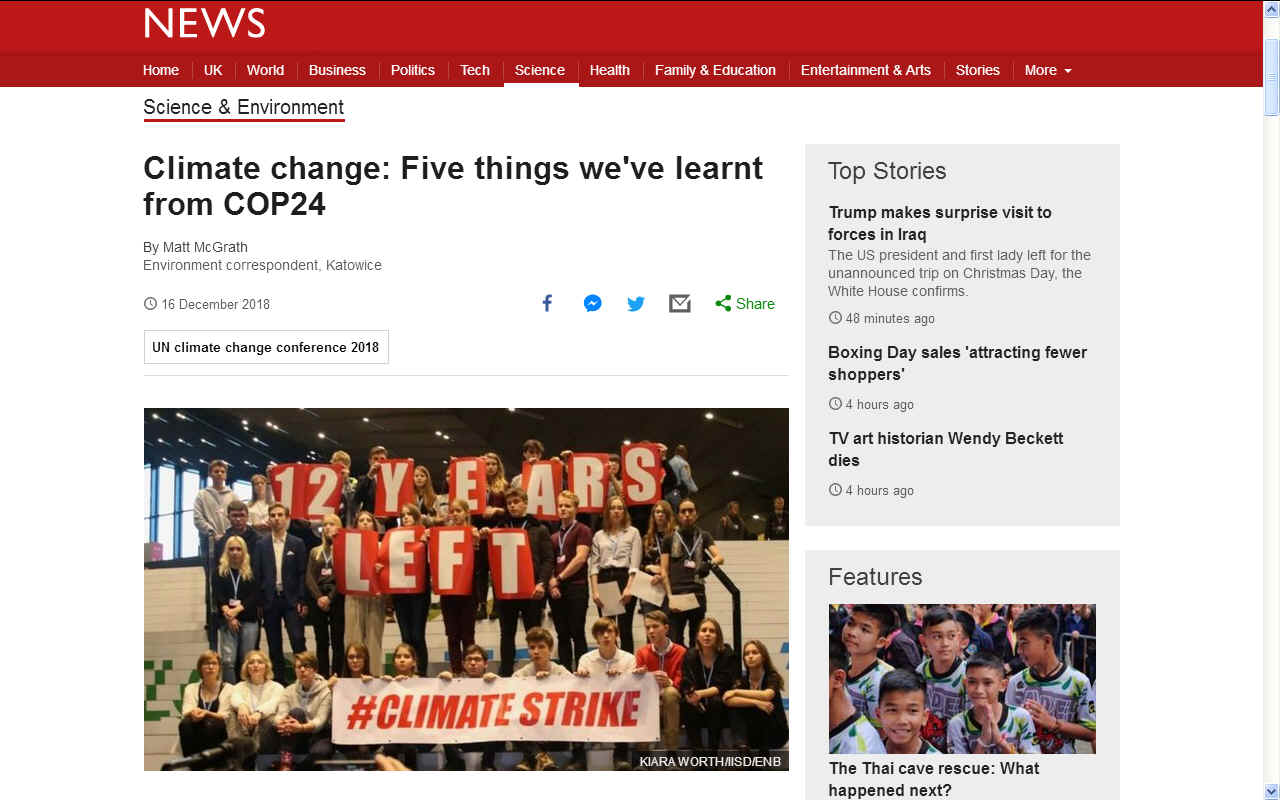
BBC
NEWS DEC
16 2018 - Delegates to the UN climate conference in Poland have reached agreement on how to implement the 2015 Paris Climate Accord, which comes into force in 2020.
1. The rules are key to the game
However dull it may be, the operational rules for the 2015 Paris climate agreement will govern the way the world tackles climate change for decades to come.
The key thing was not to unravel the carefully negotiated Paris agreement by having one set of rules for the rich countries and another one for the poor.
By that measure the conference was a success with China showing leadership by not pushing for a return to the old ways of countries who did, and countries who didn't.
Also helping that effort was the US. Ensuring that the China and the US face similar regulations has long been a key of American policy.
Keeping everyone on the same page also delighted the EU. Climate commissioner Miguel Arias Canete explained how the new rules would work.
"We have a system of transparency, we have a system of reporting, we have rules to measure our emissions, we have a system to measure the impacts of our policies compared to what science recommends."
To keep everyone in check, the rules will also contain a compliance mechanism, which means that countries that don't submit their reports on time will face an inquiry.
The new regulations are "flexible" for developing countries, meaning they can sign up to the rules at a later date.
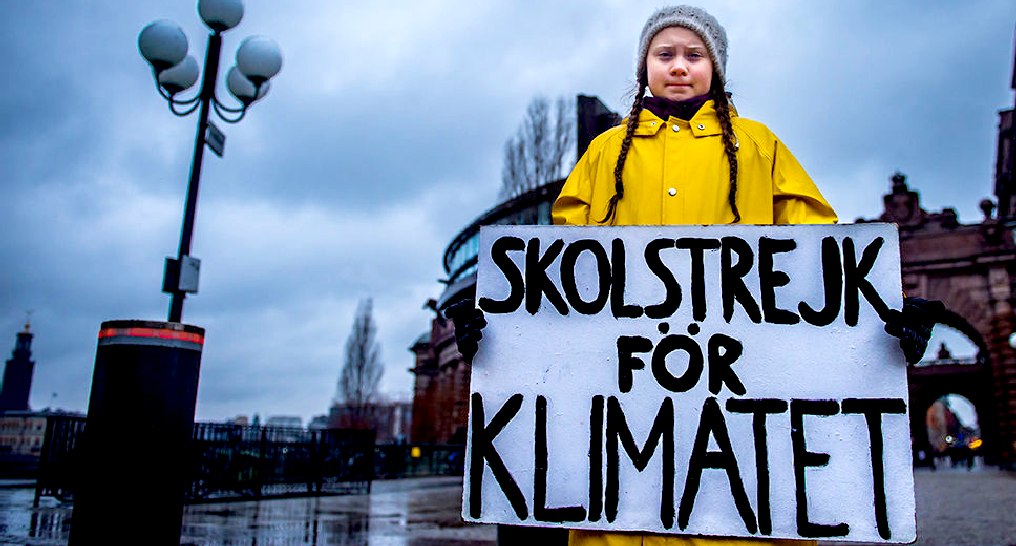
SCHOOLGIRL
15 - Out from Sweden
comes a breath of fresh air
in the form of 15 year old Greta
Thunberg who burst onto the international stage with her school
strikes, demanding climate
change action to slow global
warming from all those at COP 24 in December of 2018.
One
of the youngest ever climate activists,
she suffers from depression and autism, but manages to
overcome her difficulties when she
speaks. And what she has to say is pure logic, well
thought out and beautifully delivered. Naturally, we are huge
fans.
2. Science is worth fighting for
One of the biggest rows at this meeting was over a key scientific report from the Intergovernmental Panel on Climate Change (IPCC).
A group of countries including Saudi
Arabia, US, Kuwait and
Russia refused to "welcome" the IPCC study.
They merely wanted to "note" the contents.
Efforts to find a compromise ended in failure.
However that was not the end of the matter.
The vast majority of countries felt that acknowledging the science was critical at this conference.
Their efforts did finally ensure that the IPCC was recognised - but many felt it was a token effort.
"That science is unsettling and it doesn't connect it to the need to do more," said Camilla Born from the environmental think tank E3G.
"The deal looks at it in isolation, it's an elegant compromise but it's not really
enough.
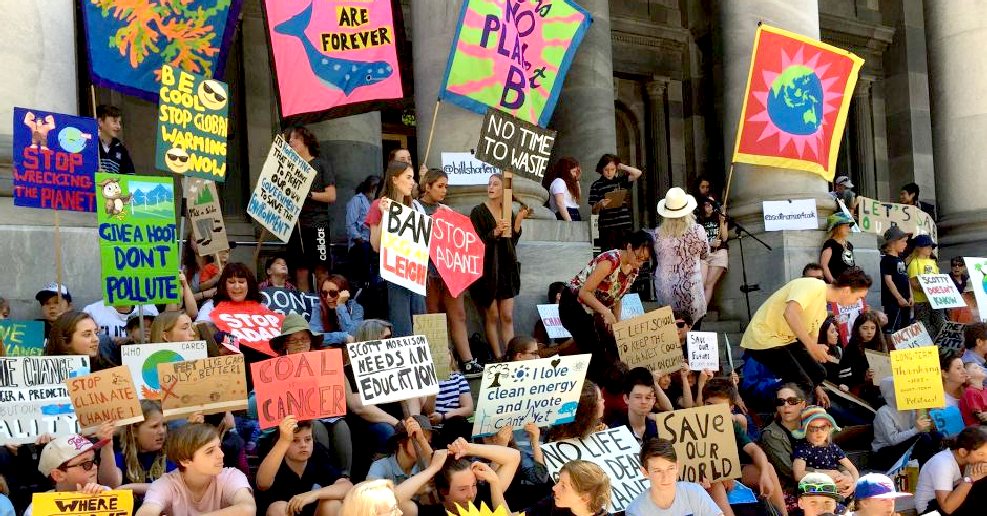
ABC NEWS 30
NOVEMBER 2018 - Thousands of Australian students have defied calls by the
Prime Minister to stay in school and instead marched on the nation's capital cities, and some regional centres, demanding an end to political inertia on climate change.
Protests were held in Melbourne, Sydney, Brisbane, Perth, Coffs Harbour, Bendigo and other cities, as students banded together to pressure the Morrison Government in the lead-up to a federal election.
"The politicians aren't listening to us when we try to ask nicely for what we want and for what we need," said Castlemaine student Harriet O'Shea Carre. "So now we have to go to extreme lengths and miss out on school."
It follows similar protests in Canberra and Hobart earlier this week, which have spurred on the junior activists.
The groundswell was inspired by 15-year-old Swedish student Greta Thunberg, who pledged to protest outside parliament in Stockholm until the country caught up on its commitments under the Paris Agreement.
News of her one-woman vigil caught the attention of Harriet O'Shea Carre and Milou Albrecht, both 14.
The pair, from the Castlemaine Steiner School, and a group of other climate-concerned teens travelled to the nearby regional city of Bendigo, about 90 minutes from Melbourne, to hold their own protest outside the office of Nationals senator Bridget McKenzie.
That in turn sparked Friday's protests across the nation.
"We have to sacrifice our education, which is something we really value, so we're showing them that at the moment this is even more important than our education," Harriet O'Shea Carre said.
"We have tried so many other ways, we've tried just asking, we've tried telling them, and so we really just need to show them now so we're just going to keep pushing and keep trying because we love the natural world."
'You don't learn anything from protesting'
But the protests have sparked their own reaction among key members of the Federal Government who have used commercial radio to dress down the students.
Resources Minister Matt Canavan said the only thing children would be learn from the protest was how to collect government benefits.
"Walking off school and protesting, you don't learn anything from that," he told Sydney radio station 2GB.
"The best thing you learn about going to a protest is how to join the dole queue.
"That's what your future life will look like, up in a line asking for a handout, not actually taking charge of your life and getting a real job."
Mr Canavan said he instead supported children learning science.
"I want kids to be at school to learn about how you build a mine, how you do geology, how you drill for oil and gas, which is one of the most remarkable scientific exploits of anywhere in the world that we do," he said.
"These are the type of things excite young children."
But Mr Canavan's comments have been roundly rejected by one parent, Trent, who was at the protest with his eight-year-old child and their friends.
"They've actually been looking at climate change at school and they have a pretty incredible understanding of the science," he told ABC Radio Melbourne.
"I think what's striking in Matt Canavan's comments is how demeaning he is about young people and what they actually know, and how he underestimates their understanding," he said.
"I heard students today at the rally talking about the IPCC report, talking about the 700 odd days until emissions can peak before we exceed 1.5 degrees.
"These are kids that actually understand the science in a way that I think most of parliamentarians don't."
Earlier this week Prime Minister Scott Morrison revealed he was also not impressed with students taking time off to protest.
"We don't support the idea of kids not going to school to participate in things that can be dealt with outside of school," he said.
"We don't support our schools being turned into parliaments. What we want is more learning in schools and less activism in schools."
'If you were doing your job properly, we wouldn't be here'
In Adelaide, about 300 students rallied at South Australia's Parliament House, forcing police to block off a lane of traffic on North Terrace as another 200 onlookers spilled onto the road.
Organiser Deanna Athanosos, who is in year 10, said Mr Morrison's rhetoric towards the strike made her laugh.
"If you were doing your job properly, we wouldn't be here," she said.
Year eight student Zel Whiting also took aim at the Prime Minister.
He said he was increasingly frustrated with the Government and its "lack of awareness or activity on climate change and its dangers".
"Mr Morrison says schools are not parliament," he said. "Mr Morrison, take a seat. You are about to be schooled.
"If everybody can contribute minor things that help the environment, such as using less plastics and not leaving your lights on — very small things — if everybody in Australia did that, we could really make a difference," he said.
3. International spirit is still alive
Many countries had worried that with the rise of nationalism in many countries and the recent election of Jair Bolsonaro as Brazil's president, the international co-operation needed to tackle climate change might be in danger.
For many getting agreement here in Katowice was less about technical rules and more about showing that the international spirit is still alive and has teeth.
"I think the beauty of multilateralism is that it is the effort of everybody," said Spanish Ecology Minister Teresa Ribera.
"And what we have seen is that everybody has supported the package, no single country has decided to step down.
"It is very difficult. It is like organising a party for 200 friends, and there's a single menu that everybody has to eat. It is not so easy but we have got it. That's fantastic!"
4. A win for the process but not for the planet?
While negotiators have been congratulating themselves on a job well done in landing the rulebook, there are many voices here who feel that the agreement does not go far enough.
They point to the strength of the science, and the public recognition of the impacts of climate change seen this year in heatwaves and wildfires.
Many environmental campaigners believe that Katowice was a missed opportunity for radical action.
"We have ended up here with more of a coal trade fair than a climate convention," said Mohamed Adow from Christian Aid, referring to the efforts to promote coal by
Poland and the US at this conference.
"We haven't acted in good faith, particularly for the young, that we takes seriously what science is telling us and we are responding to it. That message didn't come through.
"If people think the rulebook is the way to get the world on that path, it is not robust or ambitious enough."
GRETA
THUNBERG - is a Swedish climate
activist. At the COP24
climate talks in Poland, Decembel 2018, Miss Thunberg
addressed the Secretary-General of the United
Nations. She received a standing ovation for one of her
talks. She is behind the global school strike created to call
attention to climate
change. She is a rebel
with a cause. Miss
Thunberg is 15 and
autistic and the newest, youngest and most powerful voice on
the world stage demanding the world address global
warming. Go Greta!
5. New voices are emerging
One of the most striking things about this conference of the parties was the presence of
energised young people in far greater numbers than I have ever seen them at a COP before.
Climate change chimes with young people in a way that is sometimes missing with older people, who make up the bulk of negotiators here.
The sense that perhaps this UN process doesn't quite connect with the modern world was summed up best by Mohamed Nasheed, the former president of the Maldives and now their lead climate negotiator.
"Almost 10 years since I was last at these climate negotiations, I must say, nothing much seems to have changed.
"We are still using the same old, dinosaur language. Still saying the same old words.
"Still making the same tedious points."
It would be hard to argue with this view given the shenanigans that played out at the end, when one country, Brazil, held up progress at the talks on one issue for a couple of days.
Perhaps the most memorable image of this meeting was that of 15-year-old Swedish student Greta Thunberg.
This teenager who has organised school strikes in Sweden held daily press conferences here to drive home her message that platitudes and warm words just aren't enough anymore.
Her message was sharp and succinct.
"We cannot solve a crisis without treating it as a crisis."

OCEAN
MATTERS - December 2018: A side event at the Katowice Climate Change Conference focused on incorporating issues related to the ocean into nationally determined contributions (NDCs), which parties to the Paris Agreement on climate change prepare to identify the mitigation and adaptation measures their country will take in response to climate change.
Peter Thomson, UN Secretary General’s Special Envoy for the Ocean, stressed the need to address SDG 14 (life below water) in connection with SDG 13 (climate action) as well as other SDGs. He highlighted that action must focus on land-based sources of ocean pollution and called for “Source to Sea” actions, including building sewage lines to promote sanitation (SDG 6). Thomson also urged bridging the disconnect between the project financiers and information about ocean-related projects.
A number of speakers highlighted relevant upcoming meetings, including the second Ocean Conference, which will take place in Lisbon, Portugal, in June 2020. A European Regional Workshop on the “Because the Ocean” initiative will take place in April 2019, and will feature a high-level segment (HLS) to feed into the meeting of the Intergovernmental Panel on Climate Change (IPCC) that is expected to approve a Special Report on the Ocean and Cryosphere in a Changing Climate (SROCC) in Monaco in 2019. Also in 2019, a workshop on incorporating oceans in NDCs will convene in Suva, Fiji. Linkages with the ongoing negotiations on biodiversity beyond areas of national jurisdiction (BBNJ) were also noted.
A number of speakers highlighted important partnerships and initiatives for the ocean. For example, Thérèse Coffey, Department for Environment, Food and Rural Affairs, UK, spoke about the UK’s Marine Climate Change Impacts Partnership, which reports on climate change in marine areas. Nilesh Prakash, Ministry of Economy, Fiji, reiterated the importance of the Ocean Pathway Partnership to large ocean States. Susan Ruffo, Ocean Conservancy, noted the important role of the Because the Ocean initiative in making the Paris Agreement implementation guidelines ocean-friendly.
Report launches were also announced. Loreley Picourt, Ocean and Climate Platform, announced the launch of a report on the Decade of Ocean Science that will take place during Ocean Actions Day. Biliana Cicin-Sain, Global Ocean Forum, reported the completion of the second annual progress report on oceans and climate, which calls for urgent action on climate to ensure the world meets the 1.5ºC target.
The event was presented by the Ministry of Foreign Affairs, Chile, the Prince Albert II de Monaco Foundation, Tara Expéditions, the Secretariat of the Pacific Community (SPC), the Institute for Sustainable Development and International Relations (IDDRI), the Ocean Conservancy, Ocean Climate, and the World Resources Institute (WRI). Sylvie Goyet, SPC, moderated the event.

ENS
DECEMBER 17 2018
KATOWICE, Poland, December 17, 2018 (ENS) – The nearly 200 governments gathered in Katowice for the United Nations COP24 climate change conference early Sunday adopted a set of implementing guidelines for the landmark 2015 Paris Agreement, aimed at keeping global warming well below 2°C compared to pre-industrial levels.
After delegates negotiated through several sleepless nights, cheers and applause welcomed COP24 President Michal Kurtyka as he opened the closing plenary meeting, which had been postponed a dozen times.
He thanked the hundreds of delegates in the room for their “patience,” noting that the last night “was a long night.” Laughter rippled through the room as the big screens showed a delegate yawning profoundly. The meeting had been scheduled to wrap on Friday.
But the conference continued Saturday, as delegates consulted throughout the day to finalize the decisions for the Paris Agreement Work Programme. The final plenary session closed early Sunday morning.
Agreement was not unanimous. The United States, Saudi
Arabia, Kuwait and Russia are not onboard with the views of the majority of governments at COP24.
Judith Garber, principal deputy assistant secretary with the U.S. Bureau of Oceans and International Environmental and Scientific Affairs, delivered the U.S. National Statement, saying, “As
President Trump announced last year, the United States intends to withdraw from the Paris Agreement, absent the identification of terms that are more favorable to the American people. He also made clear that the United States will continue to be a leader in clean energy, innovation, and emissions reduction.”
But many delegates at COP24 did not believe that the Trump administration’s championship of “clean coal” is the way to avert climate change.
On December 10 in Katowice, as the United States hosted a side event focused on the role of “clean coal,” carbon capture and storage technologies, delegates stormed out of the event and flooded the hallways, calling on the USA to “keep fossil fuels in the ground.”
That action followed a split last week among delegates over the Intergovernmental Panel on Climate Change’s special report on the disastrous consequences if average global temperatures rise by 1.5°Celsius, and how to ensure they don’t go higher. The IPCC report was widely regarded as a wake-up call for policy makers when it was released in October.
Almost all the nearly 200 countries present in Katowice had wanted to “welcome” the IPCC report, making it a benchmark for future action.
But the United States sided with Russia, Saudi Arabia and Kuwait in blocking endorsement of the study, calling for it to be “noted” but not “welcomed.”
“The United States was willing to note the report and express appreciation to the scientists who developed it, but not to welcome it, as that would denote endorsement of the report,” the U.S. State Department said in a statement. “As we have made clear in the IPCC and other bodies, the United States has not endorsed the findings of the report.”
The objections of the four governments to the report was based on its suggestion that fossil-fuel use must be phased out by 2050 to avoid the worst catastrophes of climate change. Coal, oil and gas are major sources of carbon dioxide, which traps heat in the atmosphere.
Blasting the efforts of the United States, Saudi Arabia, Kuwait and Russia to undermine climate science as a “suicide mission” and
“criminal
enterprise,” California Governor Jerry Brown implored the world’s leaders to “wake up” and “take action now” in a video message released ahead of the close of COP24.
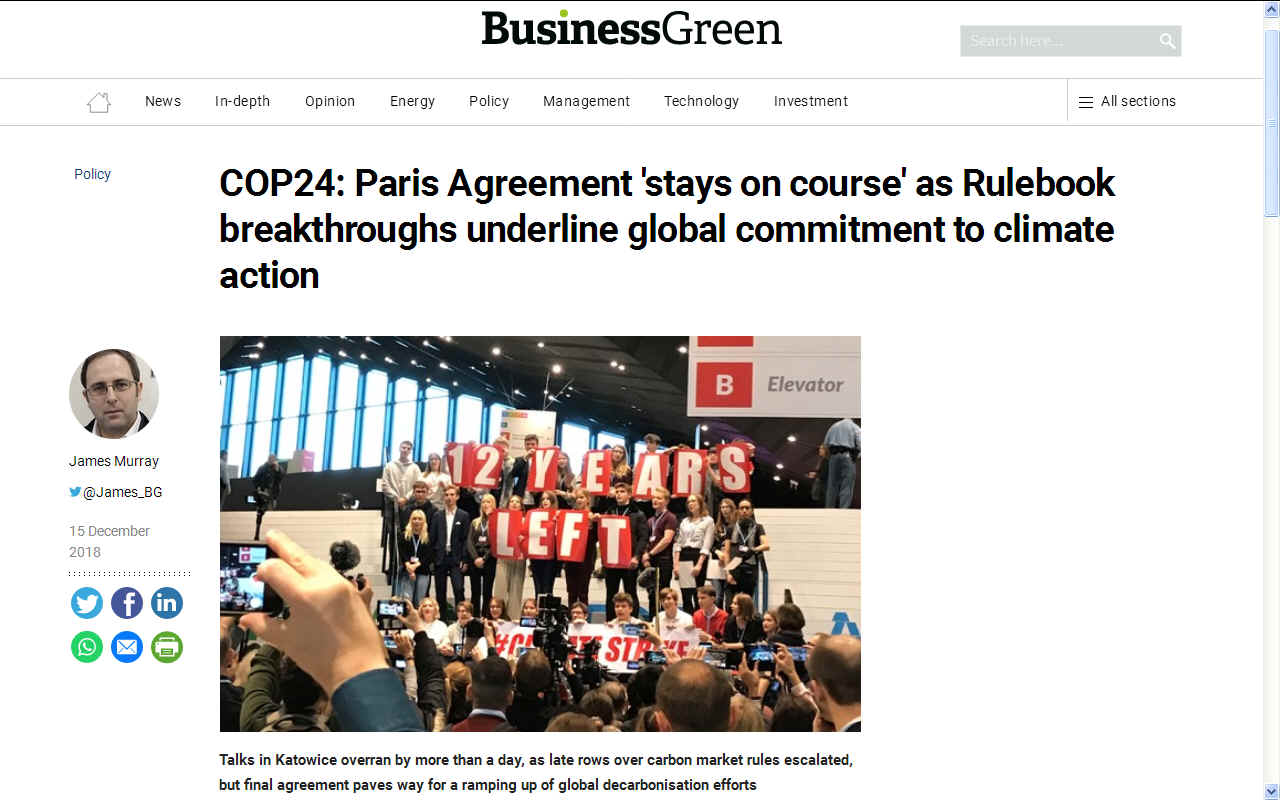
What’s In the Paris Agreement Work Programme?
One of the key components of the Katowice agreement approved by delegates is a detailed transparency framework, meant to promote trust among nations. It sets out how countries will provide information about their national climate action plans, including the reduction of greenhouse gas emissions as well as mitigation and adaptation measures.
An agreement was reached on how to uniformly count greenhouse gas emissions. If poorer countries feel they cannot meet the standards, they can explain why and present a plan to build up their capacity to do so.
On the difficult question of financing from developed countries in support of climate action in developing countries, the Katowice guidelines set a way to decide on new, more ambitious targets from 2025 onward, from the current commitment to mobilize US$100 billion per year as of 2020.
Nations also agreed on how to collectively assess the effectiveness of climate action in 2023 and how to monitor and report progress on the development and transfer of technology.
“The guidelines that delegations have been working on day and night are balanced and clearly reflect how responsibilities are distributed amongst the world’s nations,” said Patricia Espinosa, who heads the UN Framework Convention on Climate Change, UNFCCC, secretariat.
“They incorporate the fact that countries have different capabilities and economic and social realities at home, while providing the foundation for ever increasing ambition,” said Espinosa.
There was one key issue upon which delegates could not agree – the matter known as “Article 6,” regarding carbon markets or carbon trading, which enable countries to buy and sell their emissions allowances to meet a part of their domestic mitigation goals.
The Paris Agreement recognizes the need for global rules on this matter to safeguard the integrity of all countries’ efforts and ensure that each tonne of emissions released into the atmosphere is accounted for.
But agreement was not reached in Katowice, and the issue will be back on the table at the next UN climate change conference, COP25, set to take place next December in Chile.
Commenting on the adoption of the Paris Agreement Work Programme, Chair of the Least Developed Countries Group, Gebru Jember Endalew of Ethiopia, said, “While there are parts of the package that could and should have been stronger, the implementation guidelines adopted today provide a strong basis to start implementing the Agreement. The next step, of course, is for countries to take urgent, ambitious action to fulfil their Paris Agreement commitments.”
“This year, it has been made very clear that no country is immune to the impacts of climate change, but it is the nearly one billion people living in the 47 least developed countries that are often hit the hardest, suffer the most, and have the least capacity to cope,” said Endalew.
“Parties need to revise and enhance their Nationally Determined Contributions before 2020 in line with their fair share,” he said. “It is well known that current pledges will not be nearly enough to limit warming to 1.5°C. To achieve the visions and the goals of the Paris Agreement, countries must commit to greater levels of climate action and support, and follow through on those commitments.”
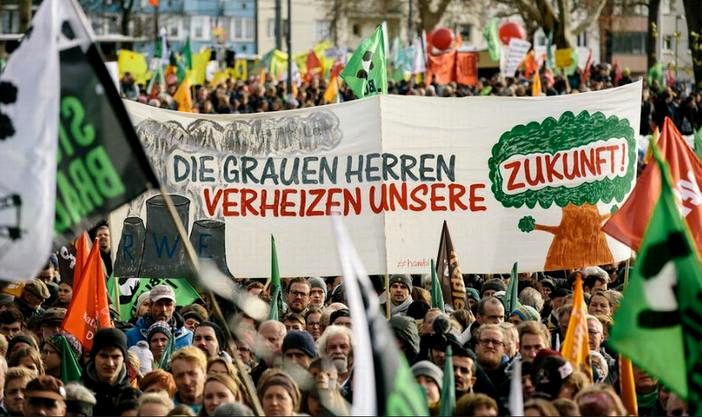
Ambition Cruicial, But Achievement Depends on Funding
The Green Climate Fund has to date funded 93 climate-calming projects and the Fund’s first replenishment drive received top-level support from both developing and developed nations during COP24.
In October, the Green Climate Fund Board approved over US$1 billion of new projects and programs to support climate action in developing countries.
The most costly of the newly approved projects is US$280 million for transforming financial systems for climate in Benin, Burkina Faso, Cameroon, Cote d’Ivoire, Ecuador,
Egypt, Kenya, Madagascar, Mauritius, Morocco, Namibia, Nigeria, Senegal, South Africa, Tanzania, Togo, and Uganda, working together with the Agence Française de Développement.
Another high-dollar project approved in this round is US$100 million for the Indonesia Geothermal Resource Risk Mitigation Project with the World Bank. See the entire list here.
One of the countries already buffeted by harsh climate impacts is Kiribati (say kee-ree-bass). Made up of 33 low-lying islands spread across an area of the Pacific Ocean the size of the United States, this Small Island Developing State is on the frontline of climate change. Minister of Finance and Economic Development Teuea Toatu said the newly created Green Climate Fund is crucial to his country’s survival.
“The GCF is the single most important fund,” Toatu said. “It is the Fund vulnerable countries rely on for our survival. It is our only hope.”
The two-week climate change meeting began on a positive note for GCF with an announcement by the German Government it will double its pledge to GCF to €1.5 billion. This was followed by Norway’s announcement that it will double its contribution to GCF’s replenishment. Ireland also indicated that it will commit additional financing to the Fund by the end of this year.
Stating the need to raise ambition for climate action, Egypt’s Minister of Environment Yasmine Fouad said that if there is “no paradigm shift, there will be no change and we will not be able to achieve the 1.5C goal.” She said, “GCF was created to be different, to be unique. We all fought for that.”
Many other encouraging announcements, especially on financial commitments for climate action, were made. The World Bank announced it would increase its commitment to climate action after 2021 to $200 billion; and the Climate Adaptation Fund received a total of $129 million.
The private sector showed strong engagement with the goals of the Paris Agreement. Among the highlights of this COP, two major industries – the sports and the fashion worlds – joined the movement to align their business practices with the goals of the Paris Agreement, through the launch of the Sports for Climate Action Framework, and the Fashion Industry Charter for Climate Action.
The COP24 Presidency announced the Driving Change Together – Katowice Partnership for Electromobility and the associated partnership between Poland and the United Kingdom.
The Driving Change Together Partnership will establish a platform for cities, regional and national governments, as well as nongovernmental organizations to develop and exchange their knowledge and experiences of e-mobility and foster establishing new practical initiatives at local and international levels.
The UK has set forth long-term ambitions for zero emission vehicles in its recently published “Road to Zero” Strategy and in September hosted the world’s first summit to accelerate global investment in zero emission technology and infrastructure.
Now Poland and the UK are urging cooperation among states, regions, cities and nongovernmental organizations to accelerate the transition to low emission vehicles and help achieve an e-mobility revolution.
“From now on, my five priorities will be: ambition, ambition, ambition, ambition and ambition,” said Espinosa on behalf of UN chief António Guterres at the closing plenary. “Ambition in mitigation. Ambition in adaptation. Ambition in finance. Ambition in technical cooperation and capacity building. Ambition in technological innovation.”
To achieve this, the UN Secretary-General is convening a Climate Summit on 23 September, at UN Headquarters in New York, to engage governments at the highest levels.
Civil Society Critical of Progress in Katowice
In addition to the political negotiations among UNFCCC Member States on the Paris guidelines over the past two weeks, the halls of COP24 were packed with 28,000 participants exchanging views, sharing innovative ideas, attending cultural events, and building partnerships for cross-sectoral and collaborative efforts.
Fossil Free, a worldwide campaign to end the age of fossil fuels, says country delegates “failed to deliver a strong enough set of guidelines.”
“Our movement has shown that we’re ready to fill the ambition gap – from the growing wave of kids’ school strikes to the way we’ve blown through a major milestone with over 1,024 divestment commitments” from institutions announced at COP24.
On Thursday in Katowice, a press conference celebrated the divestment commitments spanning 37 countries since 2012: cities like New York, Berlin and Cape Town; medical institutions like the American Public Health Association; faith groups like the Diocese of Assisi; insurance giants and investment funds like Norway’s sovereign wealth fund and the country of Ireland.
“To keep warming below 1.5°C we demand an immediate freeze on all new fossil fuel projects and a rapid and just transition to 100 percent renewable energy for all,” says Fossil Free.
Answering Swedish schoolgirl Greta Thunberg’s call for school strikes, youth in Poland, Switzerland, Germany, Sweden, and Australia skipped school for the climate. And the #climatestrike continues to spread.
And back in the United States, more than 1,000 young people flooded the halls of Congress to demand action on a Green New Deal before the end of the year, resulting in over 100 arrests. And the call for a Green New Deal has spread to Canada.
A day before the start of COP24, 75,000 people marched in Brussels, Belgium and 35,000 came out in Berlin and Cologne, Germany. On December 8, activists staged a peaceful march in Katowice and took actions to sound the climate alarm around France and Europe.
Paris Agreement Accomplishments To Date
According to the United Nations, notable achievements of the Paris Agreement on climate include:
* – At least 57 countries have managed to bring their greenhouse gas emissions down to the levels required to curb global warming.
* – There are at least 51 “carbon pricing” initiatives in the works; charging those who emit carbon dioxide per tonne emitted.
* – In 2015, 18 high-income countries committed to donating US$100 billion a year for climate action in developing countries. So far, over $70 billion has been mobilized.
* – The Paris Agreement, which provides the world with the only viable option for addressing climate change, has been ratified by 184 parties, and entered into force in November 2016.
The commitments contained in it are:
– Limit global average temperature rise to well below 2°C and pursue efforts to limit the temperature increase to 1.5°C.
– Ramp up financing for climate action, including the annual $100 billion goal from donor nations for lower-income countries.
– Develop national climate plans by 2020, including their self-determined goals and targets.
– Protect beneficial ecosystems that absorb greenhouse gases, including forests.
– Strengthen resilience and reduce vulnerability to climate change.
– Finalize a work program to implement the agreement in 2018.
That last point, the Paris Agreement Work Programme, was indeed finalized by delegates at COP24 in Katowice, despite some disagreements.
What’s Next?
The Paris Agreement on climate is scheduled to begin implementation in 2020. In preparing for that deadline, Chile will host the next UN climate summit, working with Costa Rica and other Latin American nations.
Brazil withdrew its candidacy to host the COP25 conference citing budget limitations, but environmental groups believe the move is a concession to the incoming government led by the far-right politician Jair Bolsonaro, who has threatened to pull Brazil out of the Paris Agreement.
The next summit was expected to take place between November 11 and 22, 2019, but Chilean President Sebastian Piñera now says COP25 will be held in January 2020.
President Piñera told the press, “We will have the great responsibility of leading and advancing toward a better control of climate change and global warming.”
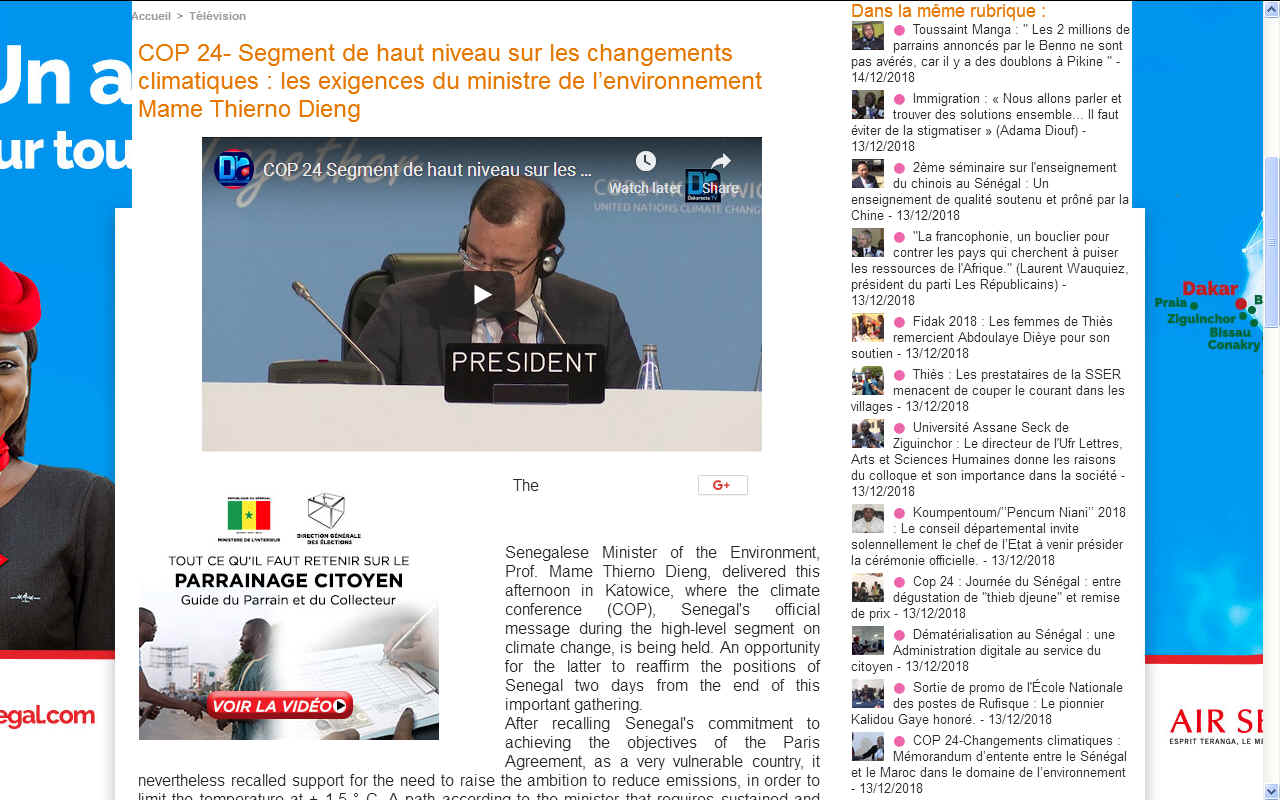
SENGAL
@ COP
24 - "After the Paris Agreement, we must convert our commitments into concrete national actions and responsible climate citizen behaviors. So efforts to move towards low-carbon and climate-resilient development must be quantified, monitored and recorded, "Prof. Dieng said.
The minister then revealed to the audience the losses and damages related to the effects of climate change on the Senegalese coast and the efforts made by the government, in the last two years, with bilateral and multilateral support, to take charge the impacts of coastal erosion and relieve heavily exposed populations for an amount of more than 26 billion FCFA. For the minister, other vital sectors such as agriculture and livestock are experiencing climatic shocks with heavy losses in local economies.
"The state is forced to adjust its budget regularly to respond to the consequences of these increasingly recurring but unpredictable events. This is not sustainable, "he will let you know.
The minister will make it known that Senegal has the ambition to become a major player in renewable energy, which by 2030 will be an important part of our "energy mix". And that, on the other hand, the recent discoveries of oil and gas on the Senegalese coast will contribute to achieving energy independence with a choice focused on the best technologies for low-carbon energy production. Efforts, which must be supported and multiplied, with the mobilization of current and future funding as a major challenge said Mame Thierno
Dieng.
He therefore insisted on financing in the implementation of the Paris Agreement through the nationally determined contribution (CDN) "predictable, accessible to all, for the needs of adaptations as mitigation" .
The Minister later noted that these efforts should also be measured, tracked and communicated internationally through the NDC's national registry, so he asked that a supreme UN body regularly the implementation of the Paris Agreement
The Green Climate Fund, established since 2009 in Copenhagen, must also reach its level of commitment, ie 100 billion US dollars per year from 2020 in view of the efforts to be made, he also wished. "Other funding is needed, including private financing, carbon market mechanisms with contribution to the adaptation fund, but also taxes on international transport," he concluded.
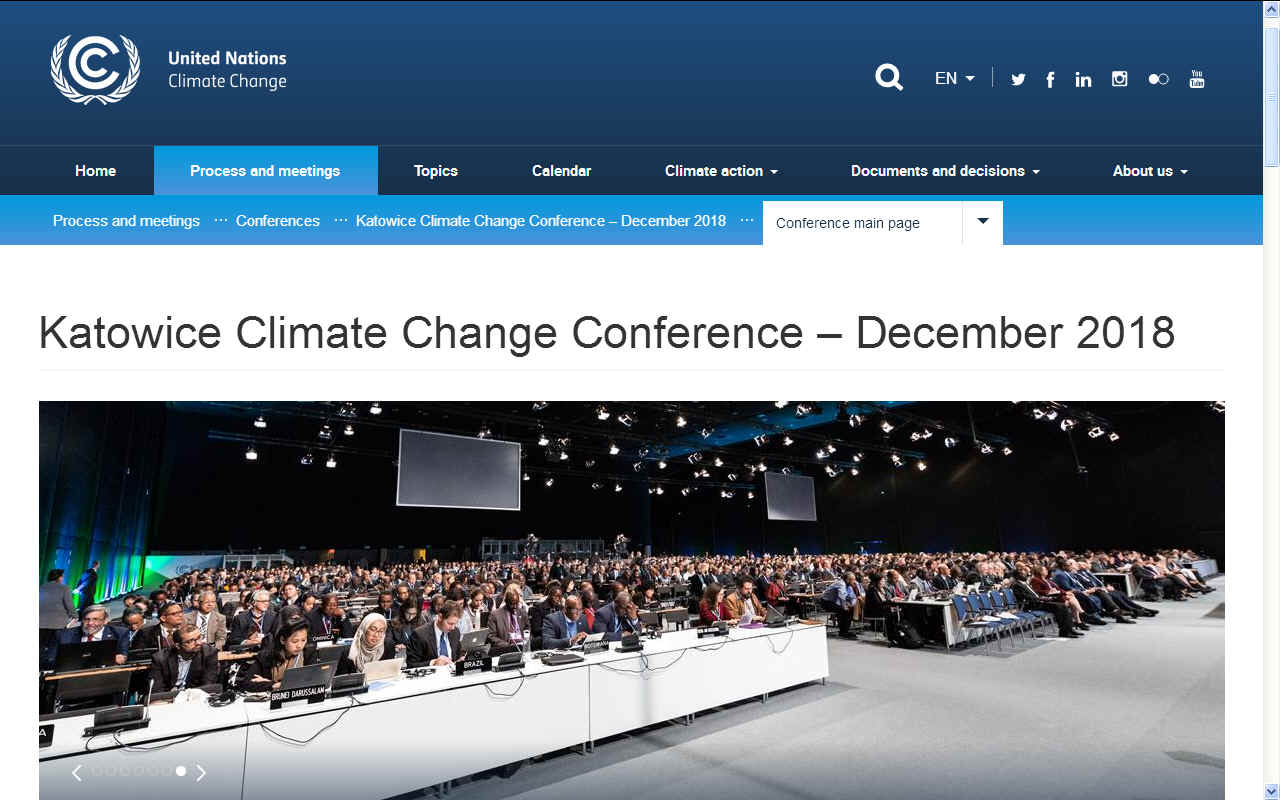
COP
24 - The UN climate summits, i.e. so called COP (Conference of the Parties) are global conferences, in the course of which action for climate policy is negotiated.
Poland hosted them twice - in 2008, in Poznań and in 2013, in Warsaw.
In December 2018, for the first time, the climate summit will take place in Katowice. In April 2017 the UN technical mission delegates, while visiting the capital of Upper Silesia, appreciated the city’s excellent preparation for the event, including its infrastructure, meeting the highest standards.
The candidacy of Katowice received recognition from Deputy Prime Minister, Minister of Finance and Development – Mateusz Morawiecki, as well as the Minister of the Environment, Professor Jan Szyszko, who stated that, ‘The whole region of Upper Silesia and Zagłębie is a very important example of what can be achieved through consistent policy of sustainable development and economic transformation. ‘
This year's summit will include: 24. Conference of the Parties to the United Nations Framework Convention on Climate Change (COP24), 14. Meeting of the Parties to the
Kyoto Protocol (CMP 14) and the Conference of Signatories to the
Paris Agreement (CMA 1).
About 20 thousand people from 190 countries will take part in the event, including politicians, representatives of non-governmental organizations, scientific community and business sector.
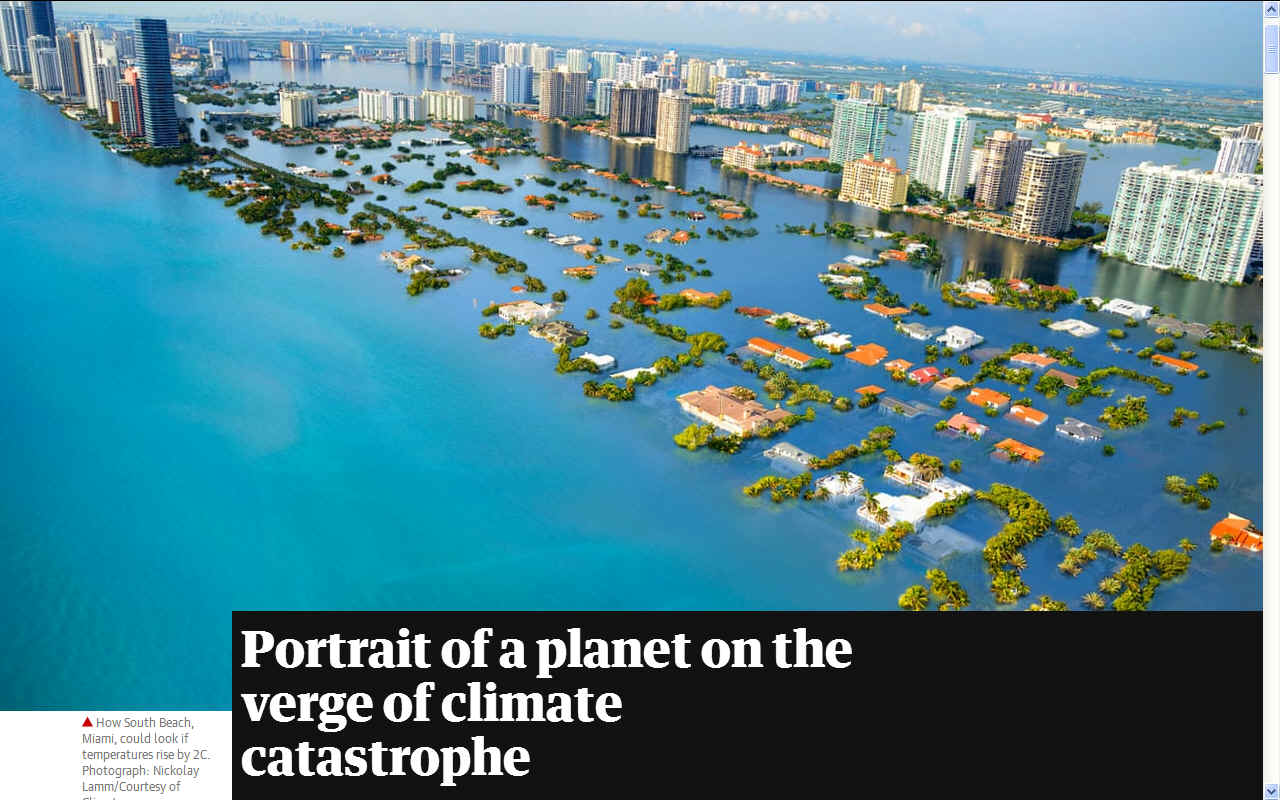
THE
GUARDIAN 2 DECEMBER 2018 - PORTRAIT OF A PLANET ON THE VERGE
OF CLIMATE CATASTROPHE
As the UN sits down for its annual climate conference this week, many experts believe we have passed the point of no return.
On Sunday morning hundreds of politicians, government officials and scientists will gather in the grandeur of the International Congress Centre in Katowice, Poland. It will be a familiar experience for many. For 24 years the annual UN climate conference has served up a reliable diet of rhetoric, backroom talks and dramatic last-minute deals aimed at halting global warming.
But this year’s will be a grimmer affair – by far. As recent reports have made clear, the world may no longer be hovering at the edge of destruction but has probably staggered beyond a crucial point of no return. Climate catastrophe is now looking inevitable. We have simply left it too late to hold rising global temperatures to under 1.5C and so prevent a future of drowned coasts, ruined
coral reefs, spreading deserts and melted glaciers.
One example was provided last week by a UN report that revealed attempts to ensure fossil fuel emissions peak by 2020 will fail. Indeed the target will not even be reached by 2030. Another, by the World Meteorological Organization, said the past four years had been the warmest on record and warned that global temperatures could easily rise by 3-5C by 2100, well above that sought-after goal of 1.5C. The UK will not be exempt either. The Met Office said summer temperatures could now be 5.4C hotter by 2070.
At the same time, prospects of reaching global deals to halt emissions have been weakened by the spread of rightwing populism. Not much to smile about in Katowice.
Nor will the planet’s woes end in 2100. Although most discussions use the year as a convenient cut-off point for describing Earth’s likely fate, the changes we have already triggered will last well beyond that date, said Svetlana Jevrejeva, at the National Oceanography
Centre, Liverpool. She has studied sea-level rises that will be triggered by melting ice sheets and expanding warm seawater in a world 3-5C hotter than it was in pre-industrial times, and concludes these could reach 0.74 to 1.8 metres by 2100. This would be enough to deluge Pacific and Indian Ocean island states and displace millions from Miami, Guangzhou,
Mumbai and other low-lying cities. The total cost to the planet could top £11trillion.
Even then the seas will not stop rising, Jevrejeva added. “They will continue to climb for centuries even after
greenhouse-gas levels have been stabilised. We could experience the highest-ever global sea-level rise in the history of human
civilisation.”
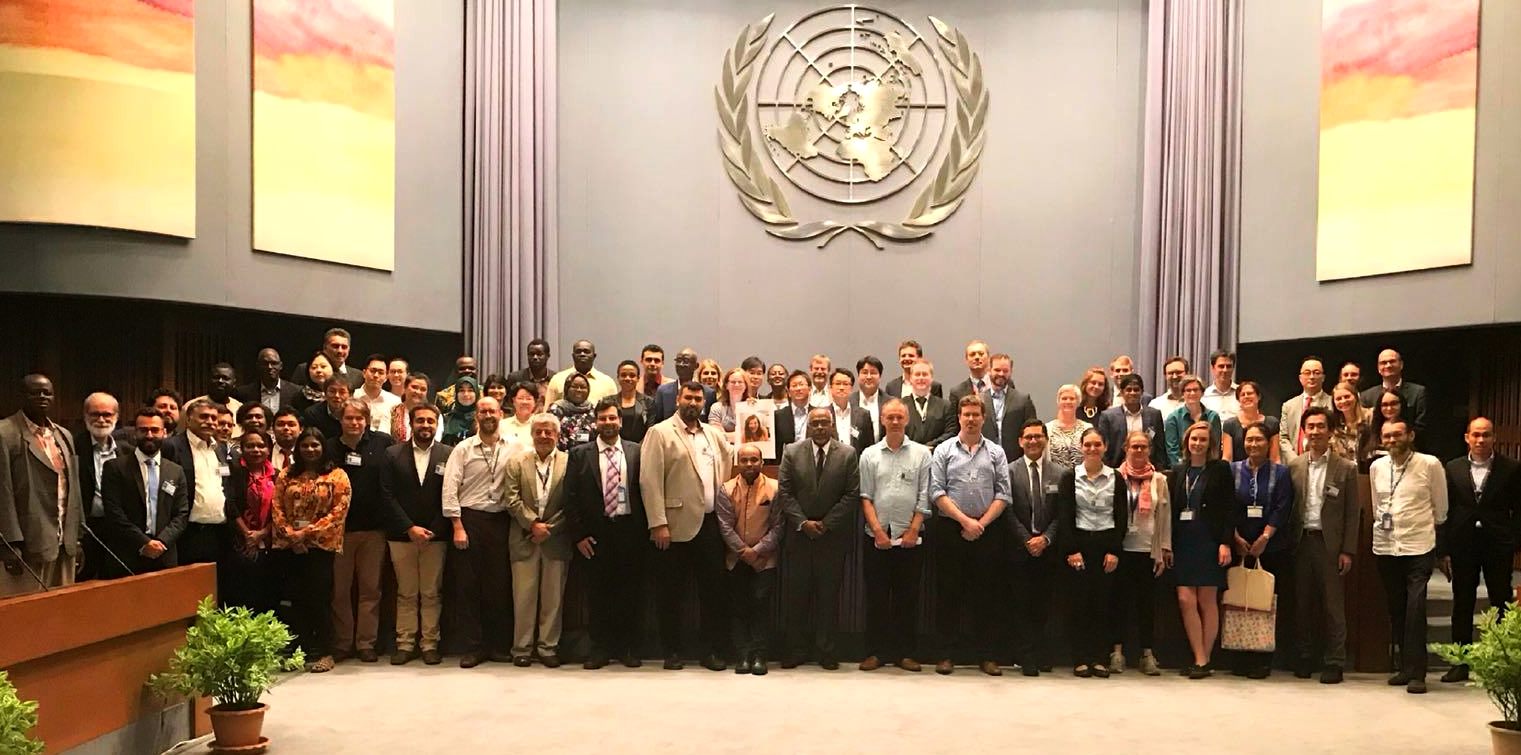
Vast tracts of prime real estate will be destroyed – at a time when land will be needed with unprecedented desperation. Earth’s population stands at seven billion today and is predicted to rise to nine billion by 2050 and settle at over 11 billion by 2100 – when climate change will have wrecked major ecosystems and turned farmlands to dust bowls.
Unfortunately many experts believe Earth’s population will actually peak well beyond 11 billion. “It could reach 15 billion,” said Sarah Harper, of Oxford’s Institute of Population Ageing. “All sorts of factors suggest women, particularly in sub-Saharan
Africa, will still want to have relatively high numbers of children and this might keep the world’s population approaching 15 billion rather than 12 billion.”
The world will have double its present numbers – but with hugely reduced areas of fertile land to provide food. We will be living in a shrunken, scorched planet bursting with human beings. Somaliland gives a grim vision of this future.
In the past few years climate change has killed 70% of its livestock and forced tens of thousands of families to flee from its scorched interior to live in refugee camps. “You can touch it, the climate change, in Somaliland. It is real. It is here,” the country’s environment minister, Shukri Ismail Bandare, said in the
Financial Times last week.
Sudan and Kenya are also victims of a drought that has dried the Horn of Africa faster than at any other time in the past 2,000 years. Similarly, in Vietnam, thousands a year are abandoning the once fertile Mekong Delta as rising seawater pollutes paddy fields. By 2050, the World Bank says more than 140 million will become climate refugees.
It will be bad for humans, but catastrophic for Earth’s other inhabitants. Arctic ice loss threatens polar bears, droughts imperil monarch butterflies, and koala habitats are being destroyed by bush fires. In all, about a sixth of all species now face extinction, say scientists, although in the end no creature or plant will be safe. “Even the most resilient species will inevitably fall victim as extreme stresses drive ecosystems to collapse,” said Giovanni Strona of
Europe’s Joint Research Centre in a report last week on
climate
change.
Scientists warned more than 30 years ago that such a future lay ahead, but nothing was done to stave it off. Only dramatic measures are now left to those seeking to save our burning planet, and these can have grim political consequences. In
France, for example, President Macron’s new levies on fossil fuels, introduced to cut emissions and to fund renewable energy projects, triggered riots. Had only modest changes been enacted a few decades ago there would be no trouble today, say analysts.
But the most telling example is provided by the US, which has emitted about a third of the carbon responsible for global warming. Yet it has essentially done nothing to check its annual rises in output. Lobbying by the fossil fuel industry has proved highly effective at blocking political change – a point most recently demonstrated by groups such as the Competitive Enterprise Institute and the Heartland Institute, which helped persuade President Trump to pull out of the Paris agreement, thus dashing the planet’s last hope of ecological salvation. “The coalition used its power to slow us down precisely at the moment when we needed to speed up,” said the environmentalist Bill McKibben in the New Yorker. “As a result, the particular politics of one country for one half-century will have changed the geological history of the
Earth.”
Florida
No region of the US has more to lose from climate change than southern Florida. If scientists’ worst predictions are realised, an entire metropolitan area, currently inhabited by more than six million people, is likely to be swamped by a 1.5-metre sea-level rise before the end of this century, a rise that could see the tourist mecca of Miami simply disappear.
It’s a doomsday scenario that has united the leaders of Miami-Dade county and the cities of Miami and Miami Beach in an attempt to find solutions to the most severe effects of rising oceans before it is too late. Their plan to combat the physical, economic and social challenges of climate change, as part of the global 100 Resilient Cities programme, will play a key role in determining whether the low-lying region will still be habitable in the coming decades or surrendered to the ever-rising Atlantic.
“It’s a problem that can be managed, it’s not a problem that can be fixed and you walk away from,” said Susanne Torriente, chief resilience officer for Miami Beach, where hundreds of millions of taxpayers’ dollars have already been spent elevating roads, constructing higher sea walls and investing in modern, high-capacity pumps and stormwater drainage systems.
“Every generation will add to the work that we have begun,” Torriente says. “We are always learning, it’s a constant process of learning, re-evaluating and improving.”
Up to a million Florida homes, worth an estimated $371bn (£290bn, are at risk of tidal flooding by 2100, one recent study calculated, but the threats facing the greater Miami region are not just coastal. Hurricanes are becoming more powerful because of global warming, say scientists, who point to the destruction wrought by Hurricane Michael in October, while the combination of a low water table and high “king” tides – occurring in autumn – causes regular inland flooding even on dry days.
This means that the new joint action plan being worked on by city and county officials has to be further-reaching than anything that has preceded it, Torriente says. “Our resilience journey began with the climate work, the storm water, [but] this strategy will be much broader and will be defining resilience not only in terms of climate and flooding, but also mobility and housing, property, and how to recover quickly in the event of a
hurricane in south Florida.”
These moves reflect the sense of urgency being felt in Florida, where the state leadership has been criticised for neglecting the environment. Its newly elected senator, Rick Scott, banned staff from using the term climate change during his time as governor of
Florida, and will be a close Washington ally of
President Donald
Trump, who took the US out of the Paris climate agreement.
“We’ll be much more successful if we have more cooperation and more attention at all levels of government, [because] it’s a problem for all of us,” Torriente says. “But we do what we can. Everything we are doing is funded locally, so we can continue to invest.”
Richard Luscombe, Miami
Madagascar
It’s a 45-minute canoe journey along the coast from regional capital Morombe to Kivalo in south-west Madagascar. Children frolic in the water, palm trees sway, and fishing nets hang along the beach. This tranquillity is deceptive, however – for Madagascar is ranked as one of the countries most vulnerable to climate change. Higher temperatures, extended drought periods in the south, intensification of cyclones and rising sea levels are all forecast. For good measure, the country’s pervasive poverty restricts its capacity to adapt to such changes.
In Kivalo, this is already a familiar picture. “The southern wind used to start in January and last until July,” says Bikison Thomas, a fisherman. “But it’s still going now in November.” On very windy days, he cannot put out to sea. “There is also more fog,” he adds. Overfishing, higher sea temperatures and the loss of mangrove, a crucial habitat for
fish stocks, are also reducing catches.
The Madagascar government is aware of the country’s vulnerability and has ratified the Paris agreement. Climate change is listed in every major policy document but budgets usually fall short of producing effective measures, a point that is demonstrated dramatically down the coast in the town of Morondava, where hotels are grappling with sea-level rise.
Two years ago, Chayune Badouraly bought the Coco Beach hotel. It had a few bungalows and a lovely beach. Badouraly added more bedrooms, a reception area and a restaurant.
But in September, powerful tides destroyed two of his bungalows, and the sea has not returned to its previous level. “We used to have 150 metres of beach,” he says bitterly. “Now it’s minus five.”
Although there are plans to build sea defences, Badouraly says that could take months, even years, so he’s taken the problem into his own hands and built a 60-metre-long sea wall, a mixture of stone blocks, steel rods and sandbags. “I knew we had coastal erosion problems, but I didn’t think it would be that bad,” he adds. “I would never have bought.”
Emilie Filou, Madagascar
Antarctica
It is hard to get a grip of the sheerscale of the Thwaites glacier in west Antarctica. It’s more than 300 miles long and 200 wide – and more than a mile thick. It drains an area of ice that is larger than England and stealthily slides towards the sea by several metres every day. Only from satellite images have we understood the shape and power of this ice monster.
These now show the beast is waking up. Thwaites’s uptake of falling snow was once matched, fairly finely, by snow and ice being lost as icebergs. Now it has begun to flow faster, along with some of its neighbouring glaciers. More ice is being lost into the ocean than is being replaced, speeding up global sea-level rise.
The cause of the disruption at Thwaites is straightforward, researchers have discovered. Increasing amounts of warm ocean water coming from the north have been melting the floating parts of the glacier and this, in turn, is letting the inland glacier run more quickly into the sea. This much we know, but we have still to understand how this process is likely to accelerate. At present, Thwaites contributes around 4% of observed sea-level rise, but it is widely agreed that this could grow exponentially. Indeed, some glaciologists believe that a complete collapse of the Thwaites glacier over coming centuries is now inevitable – and that would raise global sea level by several metres, drowning coastal ecosystems around the world, damaging coastal investments and displacing millions of people.
Research on the ice and frigid waters around Thwaites Glacier is urgently needed but carrying that out is tough. Even by Antarctic standards, this area is cold and remote. I have been working in Antarctica for more than 30 years, and I’ve never managed to reach Thwaites. However, the
UK and
US governments have agreed to send in scientists as part of the International Thwaites Glacier Collaboration. We are finally going to get the chance to understand this waking monster. At the moment, it is merely yawning and stretching. The question we must answer, urgently, is whether it is about to wake up and roar.
David Vaughan, British Antarctic Survey
Great Barrier Reef
Coral reefs cover a mere 0.1% of the world’s ocean floor but they support about 25% of all marine species. They also provide nature with some of its most beautiful vistas. For good measure, coral reefs protect shorelines from storms, support the livelihoods of 500 million people and help generate almost £25bn of income. Permitting their destruction would put the planet in trouble – which is precisely what humanity is doing.
Rising sea temperatures are already causing irreparable bleaching of reefs, while rising sea levels threaten to engulf reefs at a faster rate than they can grow upwards. Few scientists believe coral reefs – which are made of simple invertebrates related to sea anemones – can survive for more than a few decades.
Yet those who have sounded clear warnings about our reefs have received little reward. Professor Terry Hughes, a coral expert at
James Cook University in Queensland,
Australia, recently studied the impact of El Niño warmings in 2016 and 2017 on Australia’s Great Barrier Reef, the world’s largest coral reef and its largest living entity – and wept when he saw the damage.
“The 2016 event killed 30% of corals, the one a year later killed another 20%. Very close to half the corals have died in the past three years,” he said recently.
For his pains, Hughes has faced demands from tourist firms for his funding to be halted because he was ruining their business. “The Australian government is still promoting new developments of coal mines and fracking for gas,” Hughes said, after being named joint recipient of the John Maddox prize, given to those who champion science in the face of hostility and legal threats. “If we want to save the Great Barrier Reef, these outdated ambitions need to be abandoned. Yet Australia’s greenhouse gas emissions are rising, not falling. It’s a national disgrace.”
This grim picture is summed up by the ethnographer Irus Braverman in her book Coral Whisperers: “The Barrier Reef has changed for ever. The largest living structure in the world has become the largest dying structure in the world.”
by Robin McKie
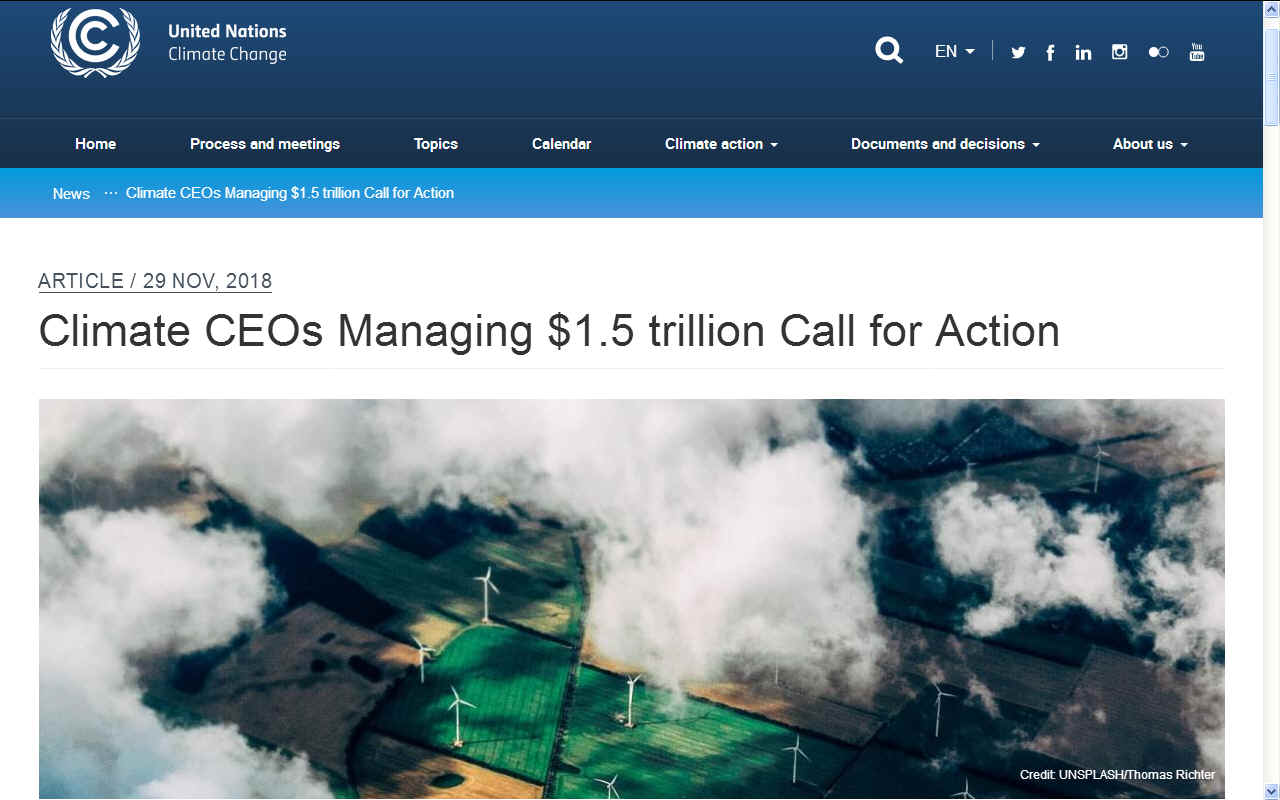
UNITED
NATIONS PRESS RELEASE 29/11/2018
UN Climate Change News, 29 November 2018 - Heads of 50 major global businesses representing more than $1.5 trillion in total revenue today publish an open letter to world government leaders urging greater collaboration to accelerate outcomes in the race against climate change.
The business leaders call to action comes as government leaders prepare for the UN Climate Change Conference COP24 (2-14 December) in Katowice, Poland, where countries are set to finalize the Paris Agreement implementation guidelines to limit the global average rise in temperature to well below 2 degrees Celsius and as close as possible to 1.5 degrees Celsius.
“If we have twelve years to avoid a ‘hothouse’ earth, we absolutely cannot pursue a business-as-usual approach. Business and government must forge new partnerships that are able to drive results much more quickly than our current international architecture allows,” said Dominic Waughray, Head of the Centre for Global Public Goods, Member of the Managing Board, World Economic
Forum.
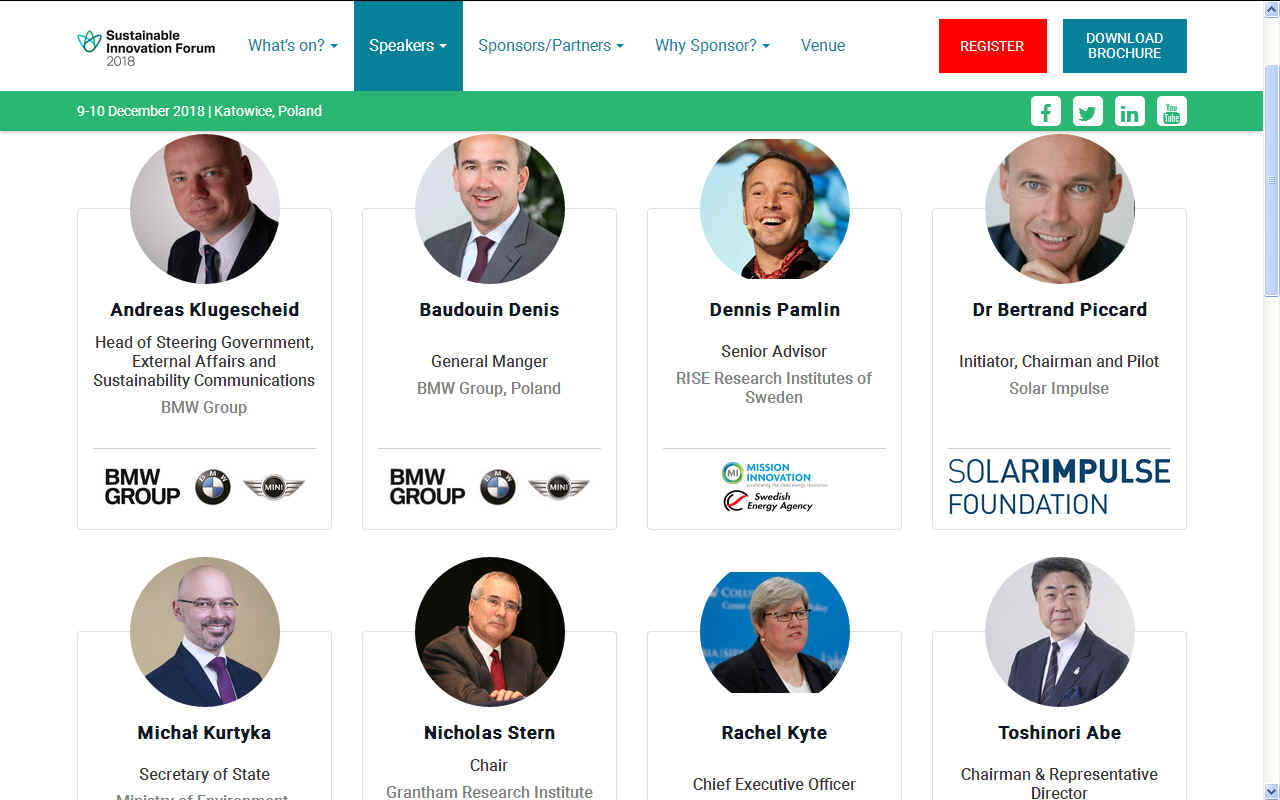
The Alliance of Climate CEOs has also provided input into the UNFCCC Talanoa Dialogue and companies will be looking for a clear signal from COP24 negotiations that governments are willing to strengthen their engagement with the private sector. When they meet in Davos in January 2019, a clear focus will be on setting goals for the UN Secretary General’s Climate Summit in September 2019 to further support the urgent action needed – a watershed moment for getting the planet on track to curb emissions and avoid global temperature rise beyond 1.5oC.
Leaders from the Forum’s Alliance of Climate Action CEOs are committed to using their positions to help meet the Paris Climate Agreement goals. Thirty of the companies that signed the open letter succeeded in reducing emissions by 9%, (more than 47 million metric tonnes in absolute terms) between 2015 and 2016, the equivalent of taking ten million cars off the road for one year.
Alliance leaders call for greater public-private cooperation to accelerate effective carbon pricing mechanisms and policies to incentivize low-carbon investment and drive demand for carbon-reduction solutions. They also highlight the business case for cutting emissions to generate wider support in the private sector.
“Business has an increasingly vital role to play in accelerating the shift to a low-carbon and climate-resilient economy. This will require partnerships with other companies, governments at all levels and civil society. It also requires bold leadership and good governance, which will allow long-term creation of shareholder value alongside long-term value for our society. We, as business leaders, are committed to climate action and stand ready to facilitate fast-track solutions to help world leaders deliver on an enhanced and more ambitious action plan to tackle climate change and meet the goals set out at the 2015 Paris Climate Agreement”, said Feike Sijbesma, Chief Executive Officer and Chairman of the Managing Board, Royal DSM, and Chair of the Alliance of CEO Climate Leaders.
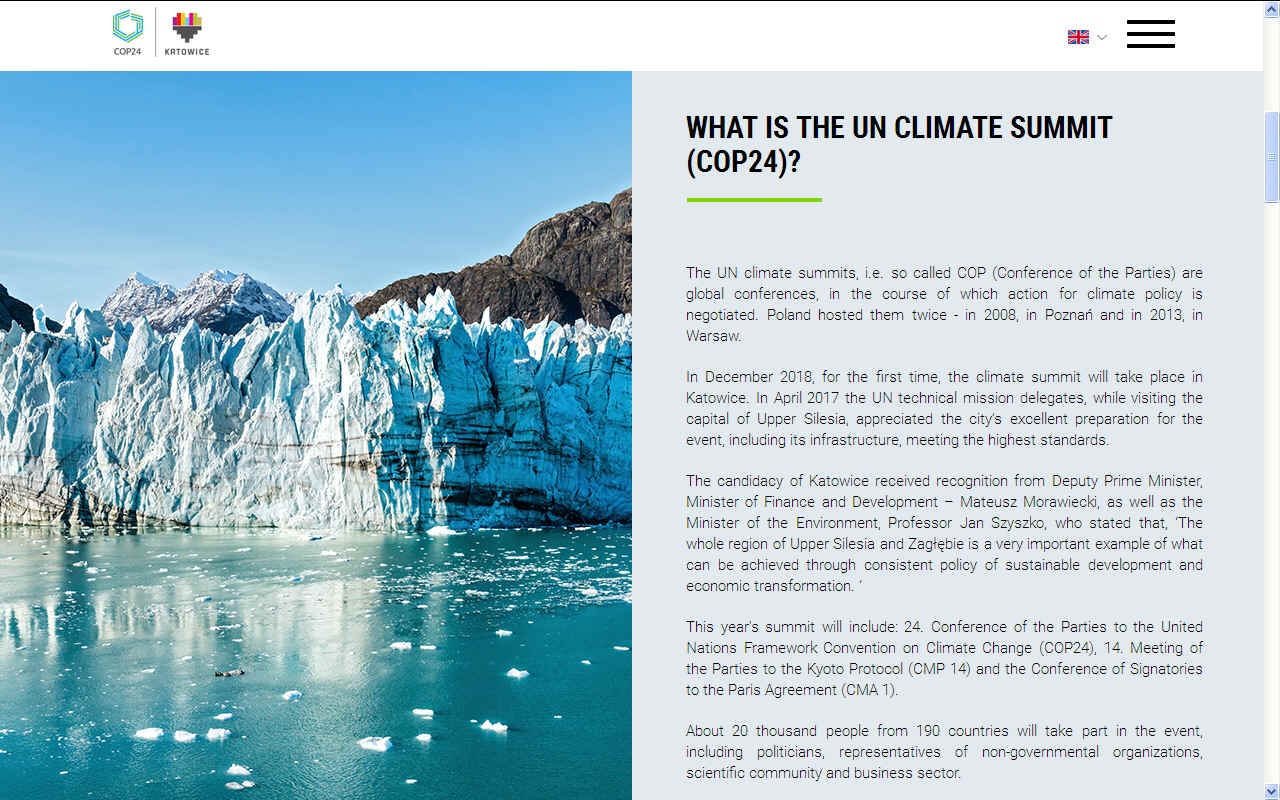
With COP24 being hailed by the UNFCCC as ‘Paris 2.0’, the Sustainable Innovation Forum presents a crucial opportunity to drive forward the Paris Agreement framework by bringing together 600+ delegates engaged with fast tracking the global green economy.
Taking place at Vienna House, Katowice the forum is within walking distance of the COP24 negotiation zone. It is the premier meeting place for policy-makers and climate technology innovators to collaborate and exchange knowledge.
Among measures taken by members of the Alliance to drive climate action within their businesses:
· BT: The UK-based telecom provider is aiming to buy 100% renewable
energy by 2020, and to have reduced carbon intensity by 87% from 2017 levels by 2030. It is also aiming to help customers cut emissions by three times its own total carbon impact by 2030.
· ENGIE: Having cut coal-fired capacity by 60% since 2016 by closing or selling plants, the
France-based energy group has adopted an internal carbon price and is now focusing on low
CO2e energy sources like natural gas and renewables, which will represent over 90% of its earnings by 2018.
· ING Group: By 2025, the banking group will only finance existing utility clients that use coal for 5% or less of their energy mix. New clients will only be financed if they have near-zero reliance on coal. As of November 2017, 60% of all utilities project financing went towards renewables.
· Ørsted: Changed its name in 2017 from Danish Oil and Natural Gas (DONG) Energy to signify its switch from oil and gas to renewable energy. The company has committed to reducing greenhouse gas (GHG) emission intensity from energy production by 96% by 2023, using a 2006 base-year.
· Royal DSM: The Netherlands-based global business in health, nutrition and sustainable living was established in 1902 as a nationalized
coal mining company. This year it has committed to an absolute GHG emissions reduction of 30% (2016-2030, Scope 1+2), among other by using 75% purchased renewable electricity by 2030. DSM uses an internal carbon price of €50 per ton of CO2e.
· Signify: Formerly Philips Lighting, the company has committed to achieve net-zero carbon buildings by 2030 and to operate a 100% electric and hybrid lease fleet by 2030.
José Manuel Entrecanales Domecq, Chairman and Chief Executive Officer, Acciona: “The second-best time to act against climate change is now; the best has already passed. It´s the moment to foster emission reduction, effective carbon prices, key partnership and climate risk management.”
Cees 't Hart, President and Chief Executive Officer, Carlsber: “We’re targeting carbon neutrality by 2030 and are excited to work alongside like-minded businesses in our drive to reach the goals of the
Paris
Agreement, through climate leadership and action.”
John Flint, Chief Executive Officer, HSBC Holdings: “Climate change is a major threat to our environment, societies and economy. Decarbonization of the economy is not straightforward, but it can be achieved by urgent and combined efforts by government, business and policy-makers. HSBC is committed to climate action and has already made significant progress towards our commitment to provide $100 billion of sustainable finance”.
Chen Kangping, Chief Executive Officer, JinkoSolar: “This is the last chance we give to ourselves. Don’t be too late to take action when grid parity is just around the corner.”
Bernard J. Tyson, Chairman and Chief Executive Officer, Kaiser Permanente: "We have a real opportunity to create synergistic public-private partnerships. Working together, we can solve these pressing climate change issues."
Tex Gunning, Chief Executive Officer, LeasePlan: “Climate change is one of the biggest challenges facing every one of us. That’s why we’re committed to working with the entire stakeholder community to speed up the transition to zero emission mobility. Our ambition is to achieve net zero emissions from our entire fleet of 1.8 million vehicles by 2030.”
“Pollution is having dramatic impact on our climate, our landscapes, our flora and fauna, and our health. We need a higher environmental engagement and a shift towards systems that address the negative and positive externalities of products and businesses. Banks should stop financing dirty businesses and shift financial flows towards a low carbon and more circular economy,” said H.S.H. Prince Max von und zu Liechtenstein, Chief Executive Officer, LGT.
Henrik Poulsen, Chief Executive Officer, Ørsted: ”Green energy is now fully competitive with fossil energy. There is no economic reason for not accelerating the transition to green energy.”
Eric Rondolat, Chief Executive Officer, Signify: “Today’s weather anomalies are the result of a temperature rise of only 1 degree Celsius. Imagine the impact on our daily lives when temperature rises 2 degrees or more. We - both political and business leaders - need to act now and accelerate targeted integrated policy interventions that stimulate sustainable business and safeguard a healthy
planet for future generations. The good news is that we can still limit
global warming with the latest available technologies, so let’s step up climate action now for the benefit of all”.
Christian Mumenthaler, Group Chief Executive Officer, Swiss Reinsurance Company Ltd.: "Climate change is impacting our societies and will cause irreversible damage if we don't act. With our partners we need to make societies more resilient and build a low-carbon future".
J. Erik Fyrwald, Chief Executive Officer and Executive Director of Syngenta International: “Climate change poses severe threats to food security, rural communities and economies. As one of the world’s leading agricultural companies we are investing more than US$1
billion every year to achieve a coherent approach to meet that challenge.”
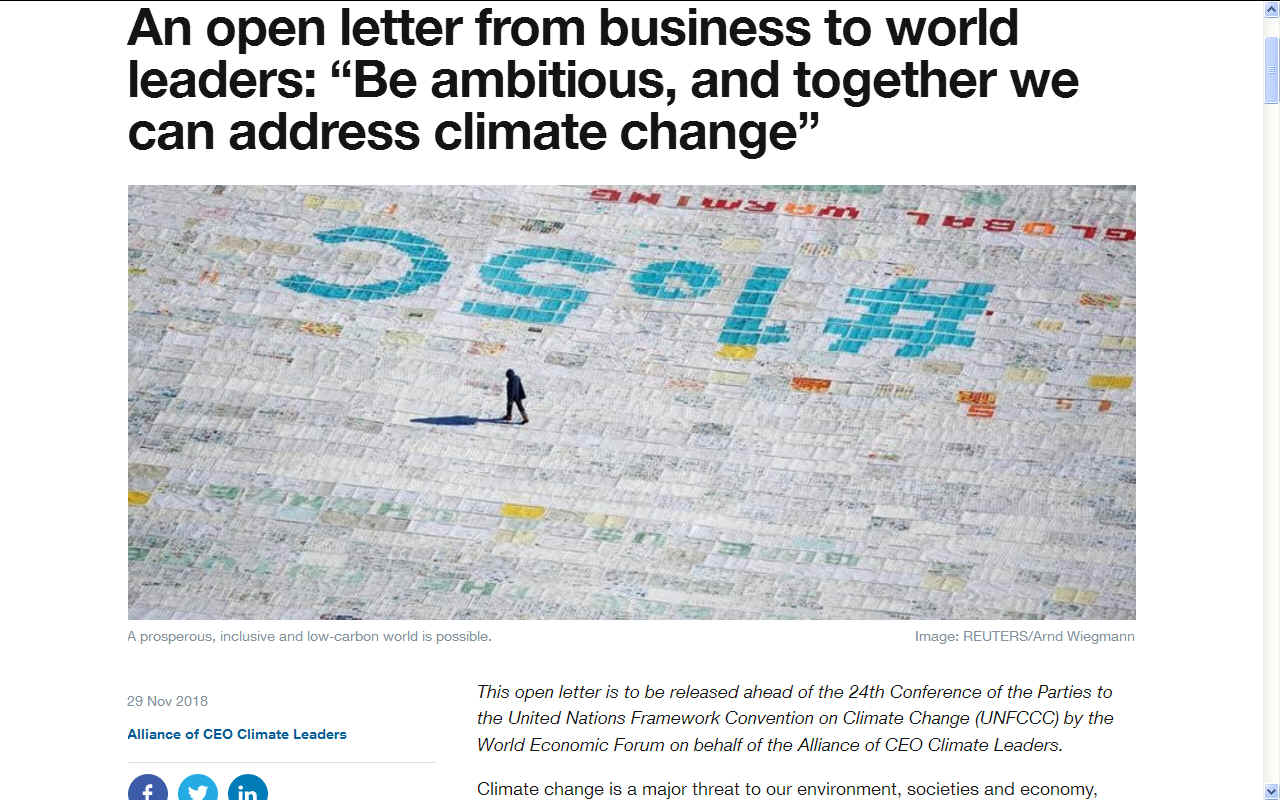
OPEN
LETTER: ALLIANCE OF CLIMATE CHANGE LEADERS 29 NOV 2018
This open letter is to be released ahead of the 24th Conference of the Parties to the United Nations Framework Convention on Climate Change (UNFCCC) by the World Economic Forum on behalf of the Alliance of CEO Climate Leaders.
Climate change is a major threat to our environment, societies and economy, endangering our well-being and prosperity. But a prosperous, inclusive and low-carbon world is possible.
As heads of global businesses, we have an urgent but simple message for world leaders, heads of government and the international community ahead of the UNFCCC COP24 in Katowice:
We are committed to climate action. We stand ready to fast-track solutions to help you deliver on an enhanced and more ambitious action plan to tackle climate change and meet the goals set out at the 2015 Paris Climate Agreement.
We know this is possible.
In 2015, our coalition the Alliance of CEO Climate Leaders – an informal group, facilitated by the World Economic Forum, of major global businesses from a range of sectors – called on governments to reach an ambitious climate deal, aligned with the UN Sustainable Development Goals.
When the Paris Agreement was reached, we confirmed our commitment to work together with the public sector and civil society to help deliver on its goals.
Since then, we have collectively reduced our own emissions by 9%* and are committed to reducing these further. We have introduced innovations and solutions, as shown in our recent Two Degrees of Transformation report.
But global greenhouse gas emissions remain at historic highs**. The aim of limiting global warming to well below two degrees is clearly not on track. We need to do more, faster, and together.
To do this, we are:
a) continuing to reduce emissions using strategies that make the most sense for our businesses
These include initiatives such as setting a (science-based) target, putting an internal price on carbon, reducing energy use, switching to renewable forms of power, and working with partners to lower emissions across value chains. All of these efforts support the goals of the Paris Agreement.
b) supportive of the thoughts behind the Task Force on Climate-related Financial Disclosures, convened by the Financial Stability Board
We will advocate for improved analysis and reporting of climate-related financial risks.
c) calling on other businesses to jointly step-up climate action
d) investing in low-carbon initiatives and companies, and in innovations to reduce greenhouse gas emissions
We urge and support world leaders to:
a) implement effective carbon pricing mechanisms that drive a meaningful price *** on carbon across the globe
b) stimulate low-carbon finance and investments by offering coherent policies that shift financial flows from high-carbon investments to the low-carbon economy, thereby encouraging innovation, as well as adaptation investments
c) develop policy tools that help educate and positively influence societal demand for low-carbon solutions
These actions and incentives, facilitated by governments and backed by continued innovation in science and technology, will enable business to create jobs and economic value during the shift to a sustainable and socially responsible, low-carbon economy. This in turn will enable governments to set more ambitious climate targets.
The shift to low-carbon economies will be positive for communities and workers, future-proofing our businesses and economies while protecting the planet for future generations.
By working together, we can accelerate this transition and realize the future that humanity wants and needs.
The UN Secretary General’s Climate Summit in 2019 represents a clear milestone. We, the undersigned members of the Alliance of CEO Climate Leaders, are ready to help government leaders and policy-makers to develop and implement an enhanced, comprehensive, inclusive and ambitious action plan for 2020 and beyond.
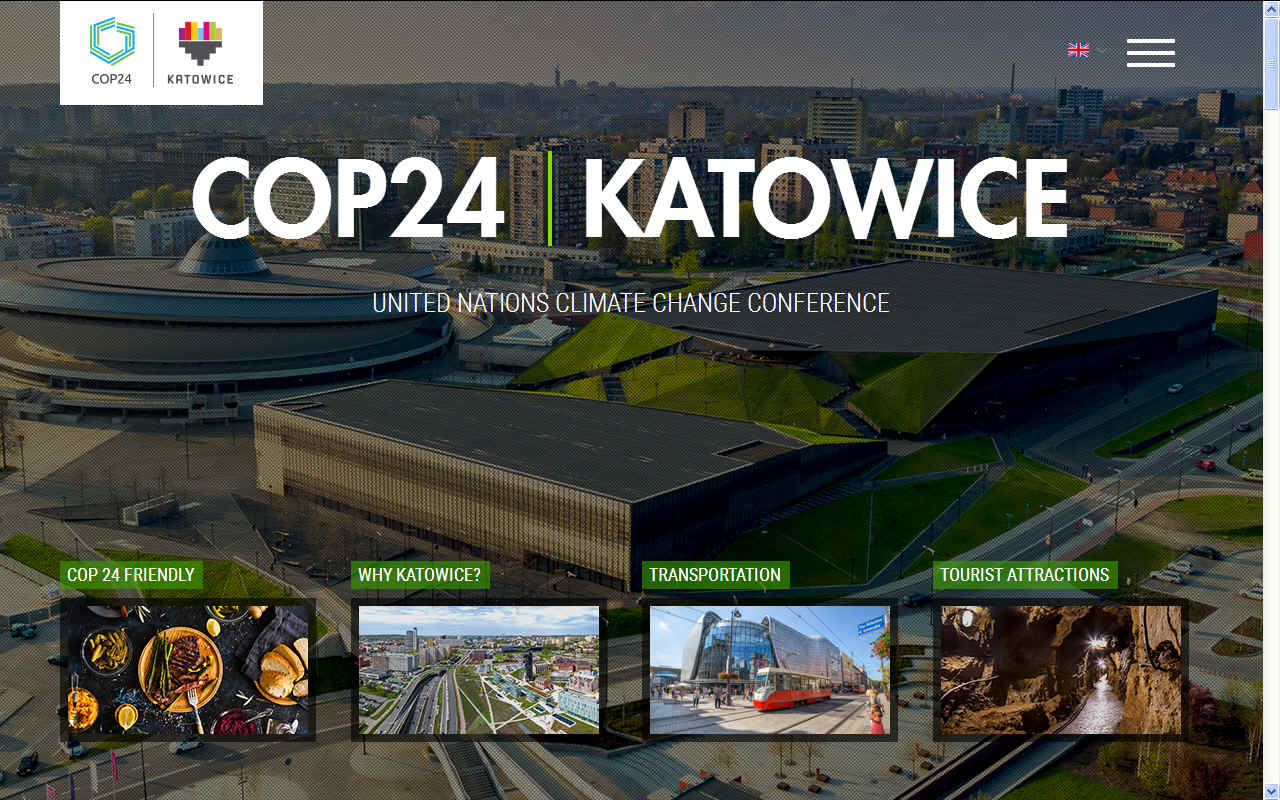
List of signatories (as of 27 November 2018):
1. Ulrich Spiesshofer, President and Chief Executive Officer, ABB
2. Pierre Nanterme, Chairman and Chief Executive Officer, Accenture
3. José Manuel Entrecanales Domecq, Chairman and Chief Executive Officer, Acciona
4. Oliver Bäte, Chief Executive Officer, Allianz
5. Peter Oosterveer, Chief Executive Officer, Arcadis
6. Gregory Hodkinson, Chairman, Arup Group
7. Thomas Buberl, Chief Executive Officer, AXA
8. Martin Brudermüller, Chairman of the Board of Executive Directors and Chief Technology Officer, BASF
9. Peter T. Grauer, Chairman, Bloomberg
10. Gavin Patterson, Chief Executive, BT Group
11. Ion Yadigaroglu, Managing Partner, Capricorn Investment Group
12. Cees 't Hart, Chief Executive Officer, Carlsberg
13. Patrick Allman-Ward, Chief Executive Officer, Dana Gas
14. Kim Fausing, President and Chief Executive Officer, Danfoss
15. Frank Appel, Chief Executive Officer, Deutsche Post DHL
16. Francesco Starace, Chief Executive Officer and General Manager, Enel
17. Isabelle Kocher, Chief Executive Officer, ENGIE Group
18. Jeffrey McDermott, Managing Partner, Greentech Capital Advisors
19. Jean-François van Boxmeer, Chairman of the Executive Board and Chief Executive Officer, Heineken
20. Ajit Gulabchand, Chairman and Managing Director, HCC
21. Ratul Puri, Chairman, Hindustan Powerprojects (Hindustan Power)
22. John Flint, Chief Executive Officer, HSBC Holdings
23. Ignacio Sánchez Galán, Chairman and Chief Executive Officer, Iberdrola
24. Salil S. Parekh, Chief Executive Officer and Managing Director, Infosys
25. Ralph Hamers, Chief Executive Officer, ING Group
26. Chen Kangping, Chief Executive Officer, JinkoSolar
27. Bernard J. Tyson, Chairman and Chief Executive Officer, Kaiser Permanente
28. Sandra Wu Wen-Hsiu, Chairperson and Chief Executive Officer, Kokusai Kogyo
29. Jan Jenisch, Chief Executive Officer, LafargeHolcim
30. Tex Gunning, Chief Executive Officer, LeasePlan
31. Stefan Doboczky, Chief Executive Officer, Lenzing
32. H.S.H. Prince Max von und zu Liechtenstein, Chief Executive Officer, LGT
33. Michael H. McCain, President and Chief Executive Officer, Maple Leaf Foods
34. Jean Raby, Chief Executive Officer, Natixis Investment Managers
35. Henrik Poulsen, Chief Executive Officer, Ørsted
36. Ross Beaty, Chairman, Pan American Silver
37. Robert E. Moritz, Global Chairman, PwC International
38. Feike Sybesma, Chief Executive Officer and Chairman of the Managing Board, Royal DSM
39. Frans van Houten, Chief Executive Officer, Royal Philips
40. Jean-Pascal Tricoire, Chairman and Chief Executive Officer, Schneider Electric
41. Eric Rondolat, Chief Executive Officer, Signify
42. Takeshi Niinami, Chief Executive Officer, Suntory Holdings
43. J. Erik Fyrwald, Chief Executive Officer, Syngenta International
44. Tulsi Tanti, Chairman, Suzlon Energy
45. Christian Mumenthaler, Group Chief Executive Officer, Swiss Reinsurance
46. Don Lindsay, President and Chief Executive Officer, Teck Resources
47. Sergio P. Ermotti, Group Chief Executive Officer, UBS
48. Paul Polman, Chief Executive Officer, Unilever
49. Anders Runevad, President and Chief Executive Officer, Vestas Wind Systems
50. Svein Tore Holsether, President and Chief Executive Officer, Yara International
Collectively, we have operations in 20 economic sectors across more than 150 countries and territories, generating more than $1.3 Trillion revenue in 2017.
* Based on 2015 and 2016 scope 1 and 2 emissions data disclosed by companies from this group that report to CDP (https://www.cdp.net/en).
** IEA Global Energy and CO2 Status Report, 2017 https://www.iea.org/newsroom/news/2018/march/global-energy-demand-grew-by-21-in-2017-and-carbon-emissions-rose-for-the-firs.html
*** Carbon Pricing Leadership Coalition, Report of the High-Level Commission on Carbon Prices, 2017 https://www.carbonpricingleadership.org/report-of-the-highlevel-commission-on-carbon-prices/
A poll among the Alliance of CEO Climate Leaders in January 2017 showed that business leaders expect a carbon price of between $30-50 per tonne to have an impact on the transition to a low-carbon economy.

G20
GLOBAL TWENTY @ 2019 - GLOBAL WARMING
|
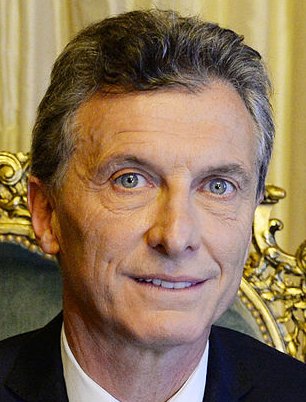
ARGENTINA
|
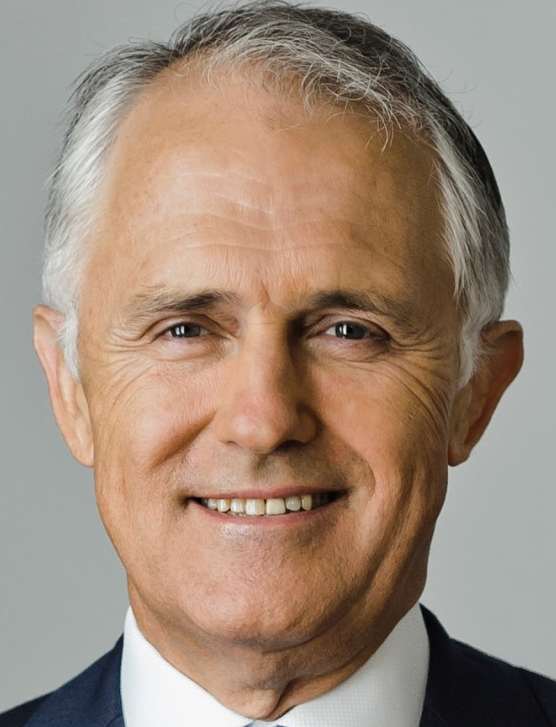
AUSTRALIA
|

BRAZIL
|

CANADA
|
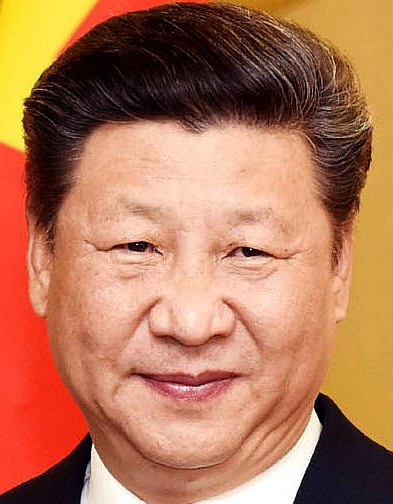
CHINA
|
|
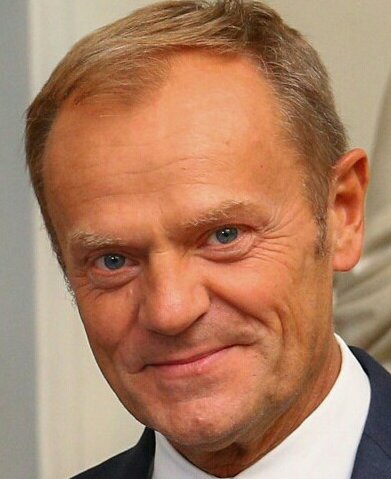
EUROPEAN
UNION
|

FRANCE
|

GERMANY
|
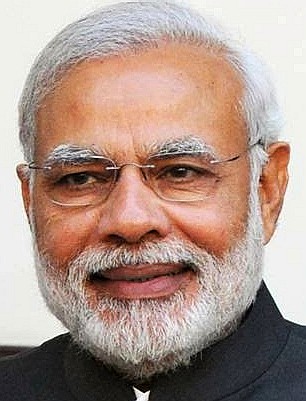
INDIA
|

INDONESIA
|
|

ITALY
|

JAPAN
|
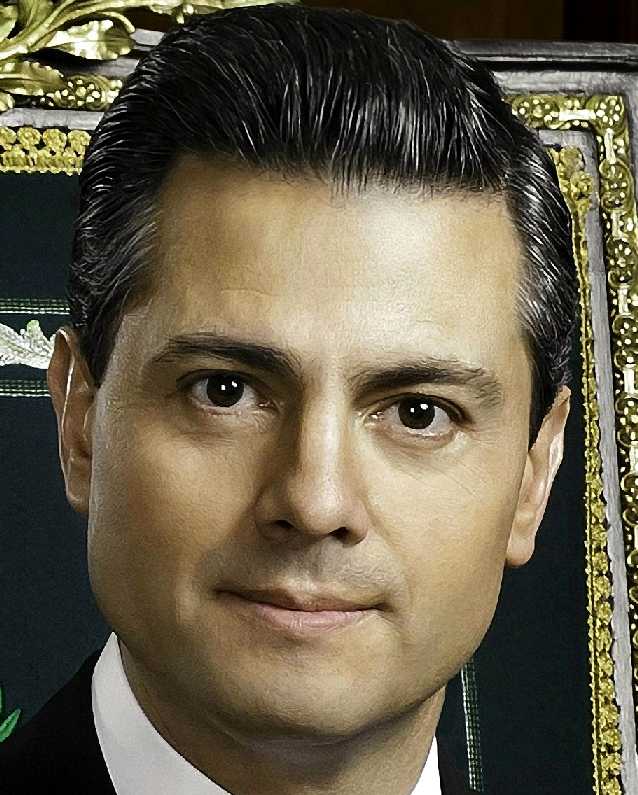
MEXICO
|

RUSSIA
|

SAUDI
ARABIA
|
|
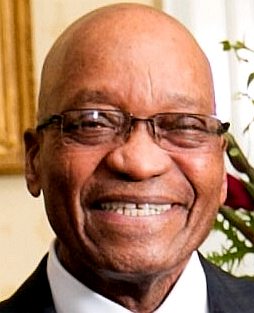
SOUTH
AFRICA
|
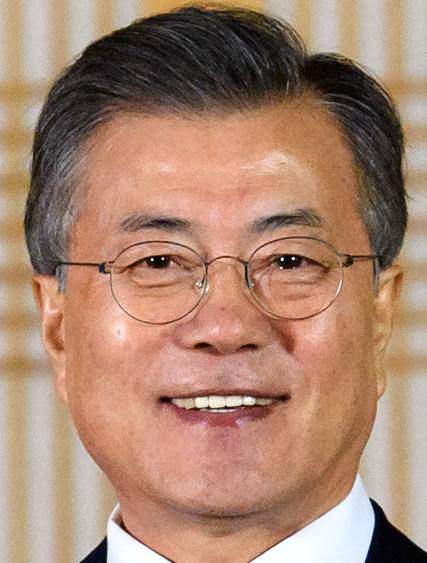
SOUTH
KOREA
|

TURKEY
|

UNITED
KINGDOM
|

UNITED
STATES
|
2019: COP 25/CMP 15/CMA
4 CHILE
COP 25 is expected to be held in November 2019 or January
2020. (COP 25/CMP 15).
1995 COP
1,
BERLIN, GERMANY
1996 COP
2, GENEVA, SWITZERLAND
1997 COP
3, KYOTO, JAPAN
1998 COP
4, BUENOS AIRES, ARGENTINA
1999 COP
5, BONN, GERMANY
2000:COP
6, THE HAGUE, NETHERLANDS
2001 COP
7, MARRAKECH, MOROCCO
2002 COP
8, NEW DELHI, INDIA
2003 COP
9, MILAN, ITALY
2004 COP
10, BUENOS AIRES, ARGENTINA
2005 COP
11/CMP 1, MONTREAL, CANADA
2006 COP
12/CMP 2, NAIROBI, KENYA
2007 COP
13/CMP 3, BALI, INDONESIA
2008 COP
14/CMP 4, POZNAN, POLAND
2009
COP 15/CMP 5, COPENHAGEN, DENMARK
2010 COP
16/CMP 6, CANCUN, MEXICO
2011 COP
17/CMP 7, DURBAN, SOUTH AFRICA
2012 COP
18/CMP 8, DOHA, QATAR
2013 COP
19/CMP 9, WARSAW, POLAND
2014 COP
20/CMP 10, LIMA, PERU
2015 COP
21/CMP 11, Paris, France
2016 COP
22/CMP 12/CMA 1, Marrakech, Morocco
2017 COP
23/CMP 13/CMA 2, Bonn, Germany
2018 COP
24/CMP 14/CMA 3, Katowice, Poland
2019 COP
25/CMP 15/CMA 4, Santiago, Chile - Madrid, Spain
2020
COP 26/CMP Postponed
2021
COP 26/ Glasgow, Scotland
2022
COP 27/ Sharm El-Sheikh, Egypt, 6-18 November
2023
COP 28/ Expo City, Dubai, UAE, 30 Nov - 12 Dec
2024
COP 29/ Absheron, Baku, Azerbaijan 11 - 24 November
DESERTIFICATION
COP HISTORY
|
COP
1:
Rome, Italy, 29 Sept to 10 Oct 1997
|
COP
9: Buenos Aires, Argentina, 21 Sept to 2 Oct
2009
|
|
COP
2: Dakar, Senegal, 30 Nov to 11 Dec 1998
|
COP
10: Changwon, South Korea, 10 to 20 Oct 2011
|
|
COP
3: Recife, Brazil, 15 to 26 Nov 1999
|
COP
11: Windhoek, Namibia, 16 to 27 Sept 2013
|
|
COP
4: Bonn, Germany, 11 to 22 Dec 2000
|
COP
12: Ankara, Turkey, 12 to 23 Oct 2015
|
|
COP
5: Geneva, Switzerland, 1 to 12 Oct 2001
|
COP
13: Ordos City, China, 6 to 16 Sept 2017
|
|
COP
6: Havana, Cuba, 25 August to 5 Sept 2003
|
COP
14: New Delhi, India, 2 to 13 Sept 2019
|
|
COP
7: Nairobi, Kenya, 17 to 28 Oct 2005
|
COP
15: 2020
|
|
COP
8: Madrid, Spain, 3 to 14 Sept 2007
|
COP
16: 2021
|
BIODIVERSITY
COP HISTORY
|
COP
1:
1994 Nassau, Bahamas, Nov & Dec
|
COP
8: 2006 Curitiba, Brazil, 8 Mar
|
|
COP
2: 1995 Jakarta, Indonesia, Nov
|
COP
9: 2008 Bonn, Germany, May
|
|
COP
3: 1996 Buenos Aires, Argentina, Nov
|
COP
10: 2010 Nagoya, Japan, Oct
|
|
COP
4: 1998 Bratislava, Slovakia, May
|
COP
11: 2012 Hyderabad, India
|
|
EXCOP:
1999 Cartagena, Colombia, Feb
|
COP
12: 2014 Pyeongchang, Republic of Korea, Oct
|
|
COP
5: 2000 Nairobi, Kenya, May
|
COP
13: 2016 Cancun, Mexico, 2 to 17 Dec
|
|
COP
6: 2002 The Hague, Netherlands, April
|
COP
14: 2018 Sharm El-Sheikh, Egypt, 17 to 29
Nov
|
|
COP
7: 2004 Kuala Lumpur, Malaysia, Feb
|
COP
15: 2020 Kunming, Yunnan, China
|
TOPICS
UNFCCC
Topics
2018
Talanoa Dialogue Platform
Adaptation
and resilience
Pre-2020
Ambition and Implementation
Cooperative
Implementation
Land
Use
Capacity-building
Science
Climate
Finance
Climate
Technology
Education
& Youth
Local
communities and indigenous peoples platform
Gender
Cancun
Pledges
The
Doha Amendment
Climate
Technology
Capacity-building
COP 24 is expected to be held on 3-14 December 2018 in
Katowice, Poland. (COP 24/CMP 14).
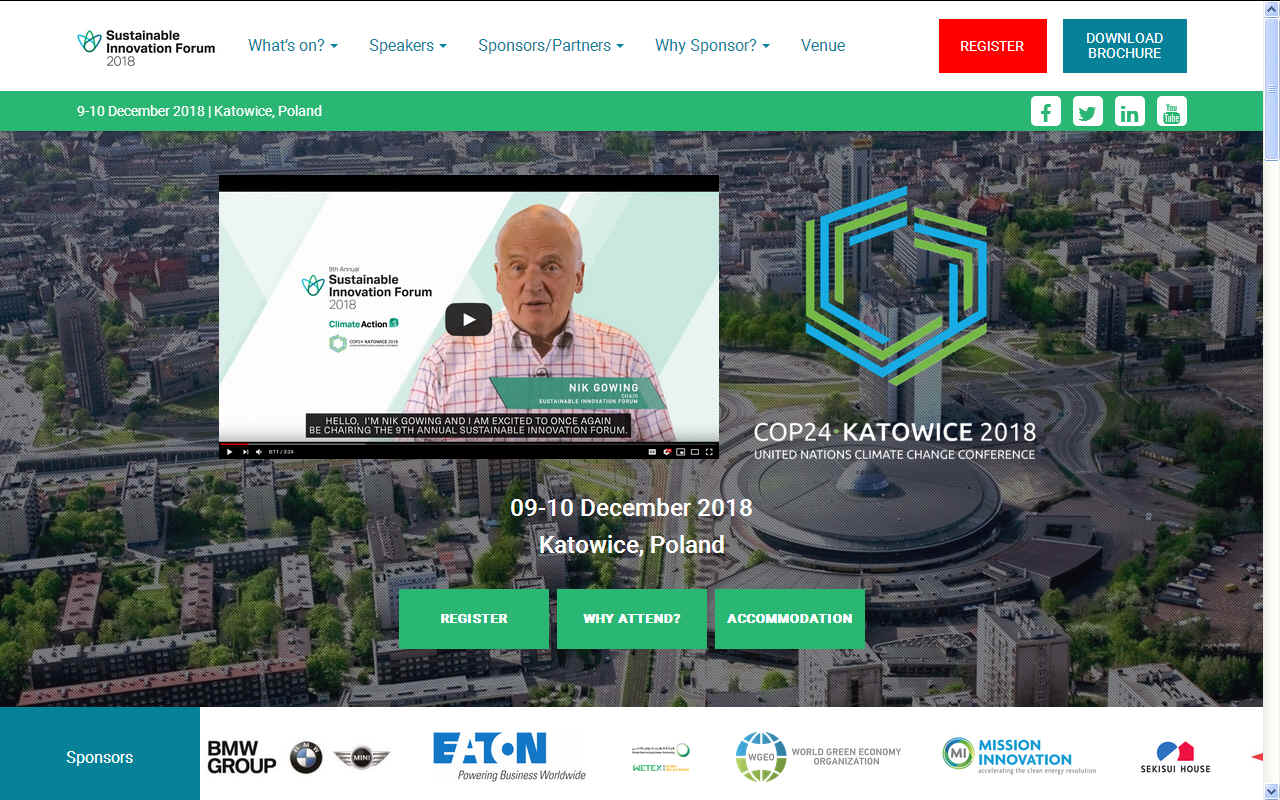
CONTACTS
The
UNFCCC secretariat is located at two different locations.
Main
office
UNFCCC secretariat
UN Campus
Platz der Vereinten Nationen 1
53113 Bonn
Germany
Haus Carstanjen Office
Martin-Luther-King-Strasse 8
53175 Bonn
Germany
Mailing address
UNFCCC secretariat
P.O. Box 260124
D-53153 Bonn
Germany
Phone: (49-228) 815-1000
Fax: (49-228) 815-1999
Web: http://unfccc.int
info@climateactionprogramme.org
http://www.climateactionprogramme.org

LINKS
& REFERENCE
http://www.cop24.katowice.eu/
https://unfccc.int/katowice
https://www.weforum.org/agenda/2018/11/alliance-ceos-open-letter-climate-change-action
https://unfccc.int/news/climate-ceos-managing-15-trillion-call-for-action
https://www.cop-24.org/
http://sdg.iisd.org/news/cop-24-side-event-discusses-ocean-ndc-linkages/
https://twitter.com/COP24
www.dakaractu.com/COP-24-Segment-de-haut-niveau-sur-les-changements-climatiques-les-exigences-du-ministre-de-l-environnement-Mame-Thierno
http://enb.iisd.org/climate/cop24/enbots/7dec.html#event-4
https://www.bbc.co.uk/news/science-environment-46582265
https://www.vox.com/energy-and-environment/2018/12/14/18139402/cop24-climate-change-katowice-poland
http://ens-newswire.com/2018/12/17/cop24-approves-paris-climate-agreement-work-program/
http://enb.iisd.org/climate/cop24/enbots/7dec.html#event-4
https://twitter.com/COP24
http://sdg.iisd.org/news/cop-24-side-event-discusses-ocean-ndc-linkages/
https://www.cop-24.org/
http://www.cop24.katowice.eu/
https://unfccc.int/katowice
https://www.weforum.org/agenda/2018/11/alliance-ceos-open-letter-climate-change-action
https://unfccc.int/news/climate-ceos-managing-15-trillion-call-for-action
https://en.wikipedia.org/wiki/United_Nations_Climate_Change_conference
http://www.climateactionprogramme.org
http://www.cop-23.org/
https://www.cop23.de/en/
This
website is provided on a free basis as a public information
service.
|



































